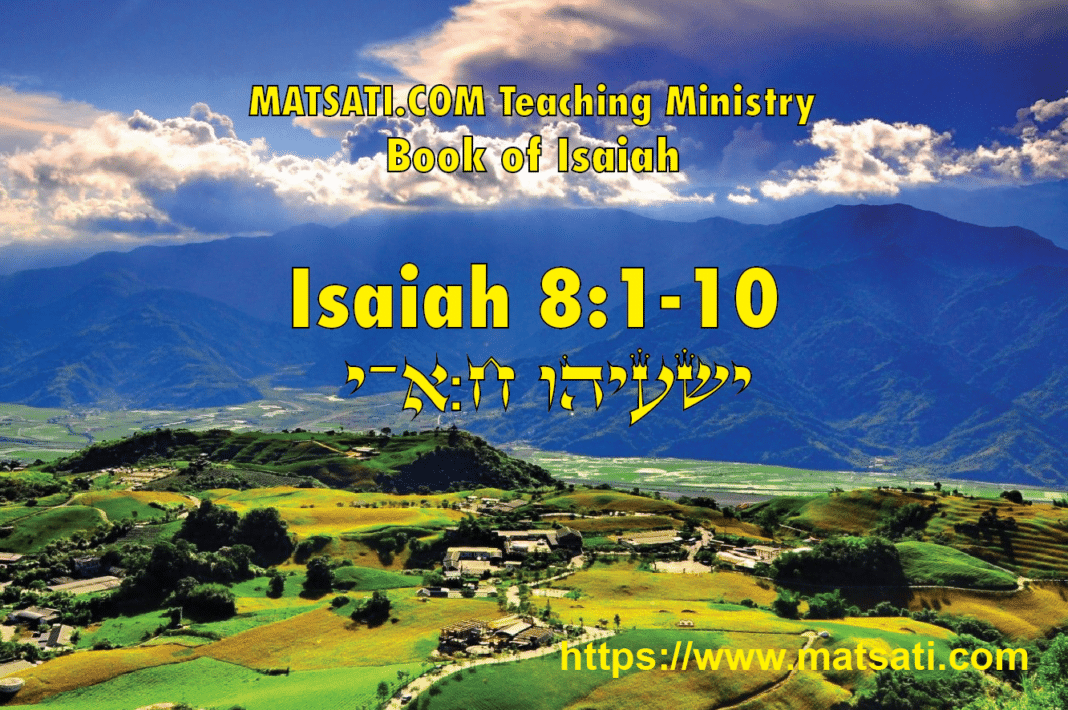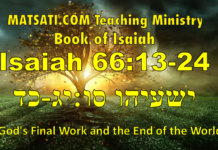Table of Contents
Introduction to Isaiah 8:1-10
Something to note about Isaiah 8 is that all things are in God’s hands. Here we read about another promise of hope (Isaiah 8:1-4), and also that of destruction (Isaiah 8:5-8) due to unfaithfulness and unrepentant sin. The theme continues, the pride of the people prevents them from trusting in the Lord God of Israel. Instead, they trust in their treaties with other nations and in their divinations. John Oswalt points out a parallel between Isaiah 8:1-4 and 7:10-17. This results in some authors believing there is a close connection between the birth, the naming of the child in Isaiah 7, and the name given here in Isaiah 8. Note Isaiah 7:14 writes, הִנֵּ֣ה הָעַלְמָ֗ה הָרָה֙ וְיֹלֶ֣דֶת בֵּ֔ן “behold the maiden was pregnant and bear a son” and Isaiah 8:3, הַנְּבִיאָ֔ה וַתַּ֖הַר וַתֵּ֣לֶד בֵּ֑ן “the prophetess will be pregnant and bear a son.” There is a clear similarity but there are also differences in the way the text is written. It is this connection that Ibn Ezra concludes the עִמָּ֥נוּ אֵֽל Emmanuel was Isaiah’s son. The point is that this son named מַהֵר שָׁלָל חָשׁ בַּז Maher-shalal-hash-baz does not satisfy the Messianic Expectation as Judah and Jerusalem are not free from conflict, they have not been redeemed, and Assyria eventually comes to conquer both Israel and Jerusalem and Judah. These things lead on to a continuing expectation, waiting for that redeemer God will send to save His people. We note that in order for peace, success, and prosperity, the Lord God Almighty needs to be involved and we need to seek Him and His help to not just walk in His commands, but to remain faithful, through all the days of our lives.
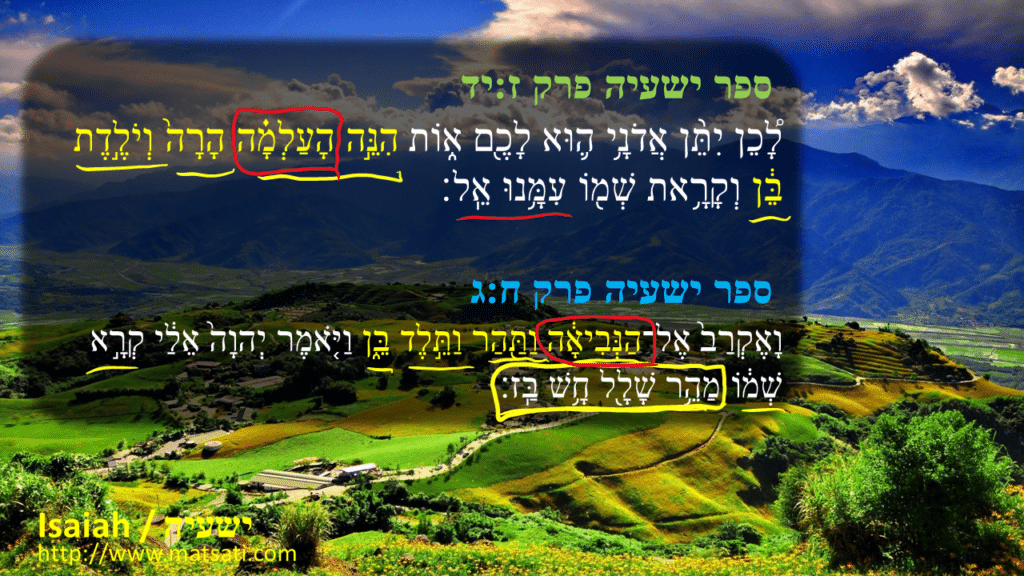
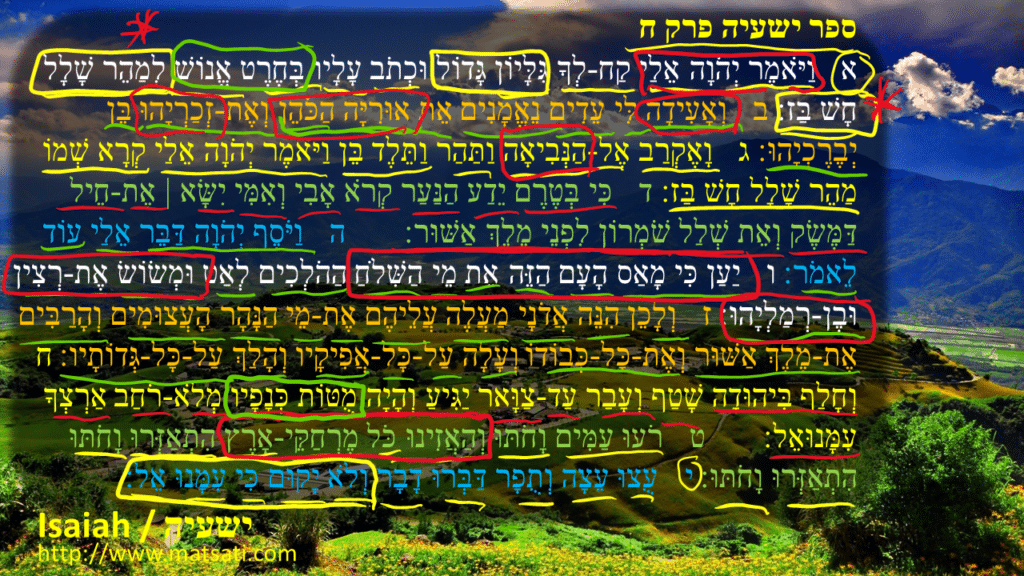
ספר ישעיה פרק ח
א וַיֹּאמֶר יְהֹוָה אֵלַי קַח-לְךָ גִּלָּיוֹן גָּדוֹל וּכְתֹב עָלָיו בְּחֶרֶט אֱנוֹשׁ לְמַהֵר שָׁלָל חָשׁ בַּז:
Isaiah 8:1 states, “Moreover the LORD said unto me, (וַיֹּאמֶר יְהֹוָה אֵלַי) Take thee a great roll, (קַח-לְךָ גִּלָּיוֹן גָּדוֹל) and write in it with a man’s pen concerning Maher-shalal-hash-baz. (וּכְתֹב עָלָיו בְּחֶרֶט אֱנוֹשׁ לְמַהֵר שָׁלָל חָשׁ בַּז)” Here HaShem tells Isaiah to write on a גִּלָּיוֹן גָּדוֹל (big scroll) then says בְּחֶרֶט אֱנוֹשׁ where חֶרֶט means pen, and אֱנוֹשׁ is a noun referring to a human being or a single man. The phrase מַהֵ֥ר שָׁלָ֖ל חָ֥שׁ בַּֽז Maher-shalal-hash-baz actually means something. This phrase means “hurry (מַהֵ֥ר) the spoils (שָׁלָל) hurry (חָשׁ) the plunder (בַּז).” There are two words of interest here, the first מַהֵ֥ר is a common Hebrew word occurring 54 times in the Tanakh, means to hurry. The other word of interest is חָשׁ which only occurs three times, twice here in Isaiah 8, and once in Habakkuk 1:8.
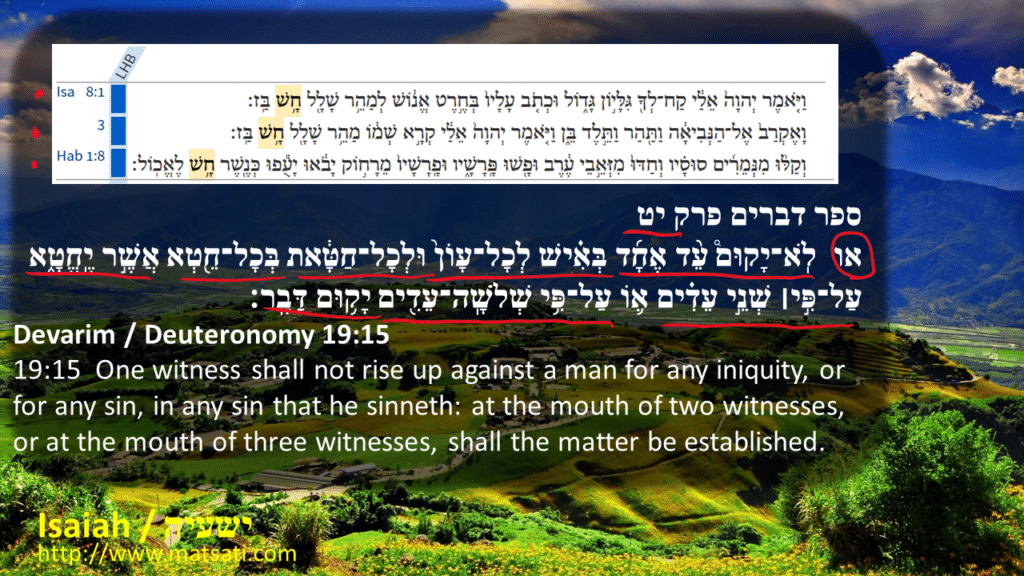

The word חָ֥שׁ in Aramaic means “suffering,” but here this word is a Qal, participle, masculine, singular, absolute meaning “swift to booty, speedy to prey.” This name that God is telling Isaiah to write down speaks to something happening quickly with an allusion to war. Here Isaiah speaks in the first person of God speaking directly to him. This indicates that Isaiah will also become a sign unto the people. The idea of taking a גִּלָּיוֹן גָּדוֹל (big scroll) means there is going to be a lot for the prophet to write down. The word גִּלָּיוֹן according to BDB means “table, tablet” and so this may suggest that HaShem is asking Isaiah to post this for the people to see and for all to be able to read. The idea בְּחֶרֶט אֱנוֹשׁ may be a way of saying to write it not just upon a גִּלָּיוֹן גָּדוֹל “a big tablet” but that it is large enough and in the common language so everyone can see and read. We also note that the phrase מַהֵ֥ר שָׁלָ֖ל חָ֥שׁ בַּֽז Maher-shalal-hash-baz is prefixed with a preposition לְ (lamed) which can have the meaning “to, towards, until, for, away, form, into, of, about” and God may be saying that this what he is to write is concerning the speediness of plunder and spoil that are to be obtained. If this was meant as an indication of the “name” of the child, then obviously it may be that this is not just predicting the birth of the child but of the impending defeat of Syria and Israel by Assyria. As the text continues, the parallel does as well as Isaiah writes that before the child reaches a certain age, Samaria and Damascus will cease being a threat.
ספר ישעיה פרק ח
ב וְאָעִידָה לִּי עֵדִים נֶאֱמָנִים אֵת אוּרִיָּה הַכֹּהֵן וְאֶת-זְכַרְיָהוּ בֶּן יְבֶרֶכְיָהוּ:
Isaiah 8:2 states, “And I took unto me faithful witnesses to record, (וְאָעִידָה לִּי עֵדִים נֶאֱמָנִים) Uriah the priest, and Zechariah the son of Jeberechiah. (אֵת אוּרִיָּה הַכֹּהֵן וְאֶת-זְכַרְיָהוּ בֶּן יְבֶרֶכְיָהוּ)” It is important to recognize that Isaiah is taking the Torah command on witnesses here, according to Devarim / Deuteronomy 19:15
ספר דברים פרק יט
או לֹֽא־יָקוּם֩ עֵ֨ד אֶחָ֜ד בְּאִ֗ישׁ לְכָל־עָוֺן֙ וּלְכָל־חַטָּ֔את בְּכָל־חֵ֖טְא אֲשֶׁ֣ר יֶֽחֱטָ֑א עַל־פִּ֣י׀ שְׁנֵ֣י עֵדִ֗ים א֛וֹ עַל־פִּ֥י שְׁלֹשָֽׁה־עֵדִ֖ים יָק֥וּם דָּבָֽר׃
Devarim / Deuteronomy 19:15
19:15 One witness shall not rise up against a man for any iniquity, or for any sin, in any sin that he sinneth: at the mouth of two witnesses, or at the mouth of three witnesses, shall the matter be established.
This is an important reminder on the significance of the Torah in the lives of the people, especially the command of witnesses even for us today in a court of law. The word וְאָעִידָה is a verb written in the Hif’il, vayiqtol (vav-conjunctive + imperfect), first person, singular, cohortative, meaning “to call to testify.” If we consider the translations of this verse from the TgJ, the L-Peshitta, and the LXX we see the following:
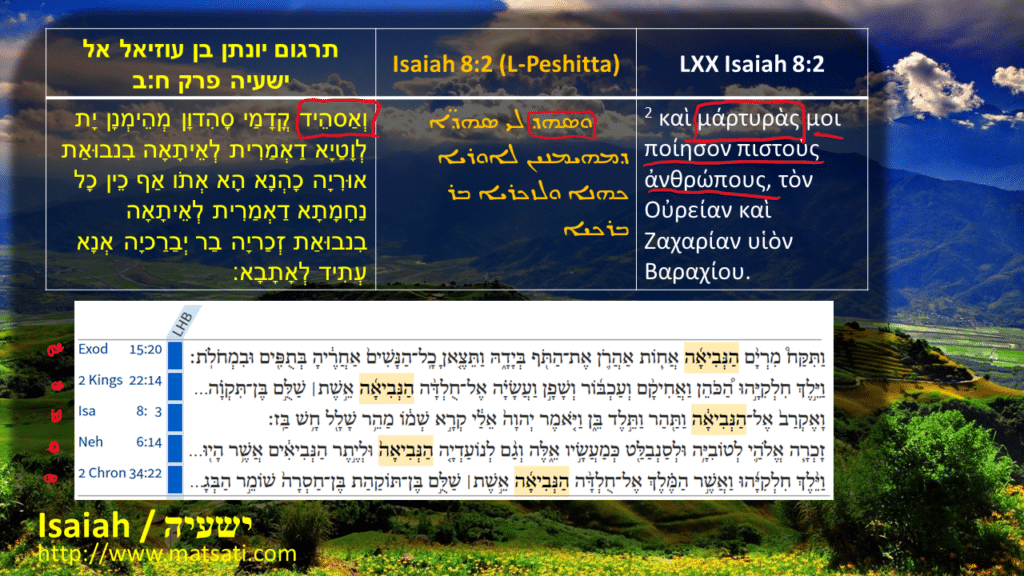
תרגום יונתן בן עוזיאל אל ישעיה פרק ח:ב
וְאַסהֵיד קֳדָמַי סָהִדוָן מְהֵימְנָן יָת לְוָטַיָא דַאְמַרִית לְאֵיתָאָה בִנבוּאַת אוּרִיָה כָהְנָא הָא אְתֹו אַף כֵין כָל נַחָמָתָא דַאְמַרִית לְאֵיתָאָה בִנבוּאַת זְכַריָה בַר יְבַרַכיָה אְנָא עְתִיד לְאָתָבָא׃
Isaiah 8:2 (L-Peshitta)
ܘܣܗܕ ܠܝ ܣܗ̈ܕܐ ܕܡܗܝܡܢܝܢ ܠܐܘܪܝܐ ܟܗܢܐ ܘܠܙܟܪܝܐ ܒܪ ܒܪܟܝܐ
LXX Isaiah 8:2
2 καὶ μάρτυρὰς μοι ποίησον πιστοὺς ἀνθρώπους, τὸν Οὐρείαν καὶ Ζαχαρίαν υἱὸν Βαραχίου.
In Aramaic, the TgJ the word וְאַסהֵיד is a verb written in the (h)aphel form meaning “to testify,” The L-Peshitta ܘܣܗܕ which is a peal perfect, masculine, third person, singular meaning to witness or testify. The Peal verb form represents the basic action of the syriac verb, and it is active in the sense of performing the action of the verb. The LXX μάρτυρὰς is a noun, accusative, plural, masculine meaning “witness” where the phrase καὶ μάρτυρὰς μοι ποίησον πιστοὺς ἀνθρώπους “and witness I will make/do the trustworthy/faithful man” indicating the approach that Isaiah is taking is to be intentional to obey the Torah command in bringing these witnesses. What is interesting about this particular aspect of the text is that nowhere else is a prophetic writing witness according to the Scriptures. (John Oswalt) The exact purpose of this is not clear, but the interpretation follows the narrative as Ahaz instructing the construction or modification of the altar to correspond to the false god of Assyria, the Lord God is calling Ahaz’s high priest Zechariah to bear witness of this sign of the child that is born.
ספר ישעיה פרק ח
ג וָאֶקְרַב אֶל-הַנְּבִיאָה וַתַּהַר וַתֵּלֶד בֵּן וַיֹּאמֶר יְהֹוָה אֵלַי קְרָא שְׁמוֹ מַהֵר שָׁלָל חָשׁ בַּז:
Isaiah 8:3 states, “And I went unto the prophetess; (וָאֶקְרַב אֶל-הַנְּבִיאָה) and she conceived, (וַתַּהַר) and bare a son. Then said the LORD to me, Call his name Maher-shalal-hash-baz. (וַתֵּלֶד בֵּן וַיֹּאמֶר יְהֹוָה אֵלַי קְרָא שְׁמוֹ מַהֵר שָׁלָל חָשׁ בַּז)” Here is the parallel to Isaiah 7:14 which writes, הִנֵּ֣ה הָעַלְמָ֗ה הָרָה֙ וְיֹלֶ֣דֶת בֵּ֔ן “behold the maiden was pregnant and bear a son” and הַנְּבִיאָ֔ה וַתַּ֖הַר וַתֵּ֣לֶד בֵּ֑ן “the prophetess will be pregnant and bear a son.” We note that God directly tells Isaiah to call the name of the child Maher-shalal-hash-baz (קְרָא שְׁמוֹ מַהֵר שָׁלָל חָשׁ בַּז). So this child’s name is representative of what is about to take place as a sign to Ahaz and the priest. The Tanakh doesn’t seem to provide much information for who “the prophetess” (הַנְּבִיאָה) in Isaiah 8:3 is. Who is she? Many seem to assert that she is his wife,but cite no evidence to support this. The word הַנְּבִיאָ֜ה (the prophetess) occurs 5 times as spelled in the bible.

We note that in Shemot / Exodus 15:20, הַנְּבִיאָ֜ה is a reference to Aaron’s sister Miriyam. In 2 Kings 22:14, we read about how Hilkiah the priest, Ahikam, Akbor, Shaphan and Asaiah went to speak to the prophet Huldah, who was the wife of Shallum son of Tikvah, the son of Harhas. In Nehemiah 6:14 the prophet speaks of Tobiah and Sanballat, and the female prophet Noadiah and how she and the rest of the prophets have been trying to intimidate Nehemiah. In 2 Chronicles 34:22, is another record of Hilkiah the priest, Ahikam, Akbor, Shaphan and Asaiah going to speak to the prophet Huldah. The idea though is that this word הַנְּבִיאָ֜ה is spoken of infrequently and so who this prophetess is remains a question. This is a parallel to the הָעַלְמָ֗ה the Almah, the young maiden, an unknown woman. The idea is that either the wife of Isaiah being called הַנְּבִיאָ֜ה due to her being the wife of the prophet, or that she was a prophet herself. There is much proof for women prophets according to the Tanakh (Shemot / Exodus 15:20, Judges 4:4, 2 Kings 22:14, Nehemiah 6:14).
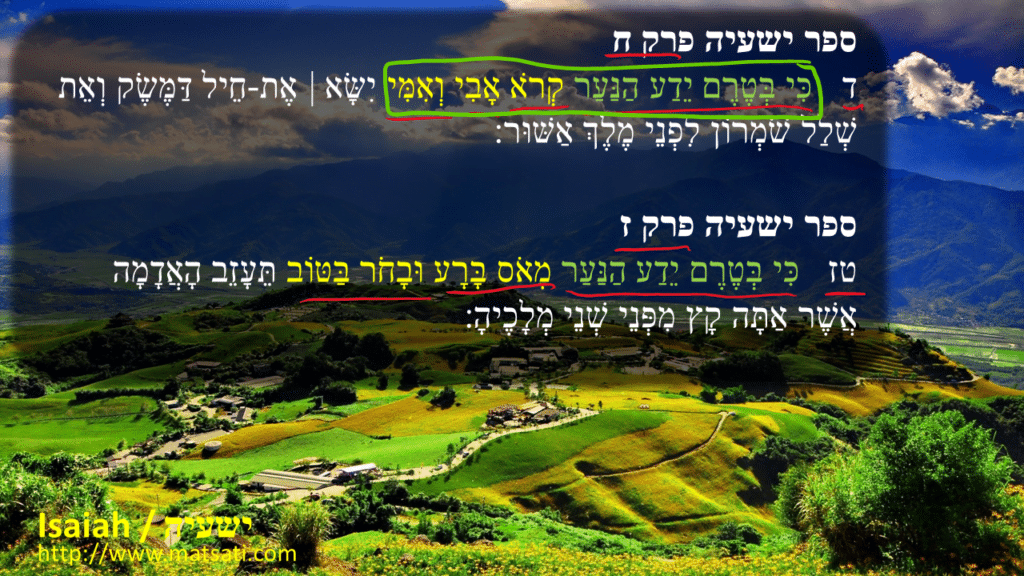
ספר ישעיה פרק ח
ד כִּי בְּטֶרֶם יֵדַע הַנַּעַר קְרֹא אָבִי וְאִמִּי יִשָּׂא | אֶת-חֵיל דַּמֶּשֶֹק וְאֵת שְׁלַל שֹׁמְרוֹן לִפְנֵי מֶלֶךְ אַשּׁוּר:
Isaiah 8:4 states, “For before the child shall have knowledge to cry, My father, and my mother, (כִּי בְּטֶרֶם יֵדַע הַנַּעַר קְרֹא אָבִי וְאִמִּי) the riches of Damascus and the spoil of Samaria (יִשָּׂא | אֶת-חֵיל דַּמֶּשֶֹק וְאֵת שְׁלַל שֹׁמְרוֹן) shall be taken away before the king of Assyria. (לִפְנֵי מֶלֶךְ אַשּׁוּר)” We note the parallel to Isaiah 7:16.
ספר ישעיה פרק ז
טז כִּי בְּטֶרֶם יֵדַע הַנַּעַר מָאֹס בָּרָע וּבָחֹר בַּטּוֹב תֵּעָזֵב הָאֲדָמָה אֲשֶׁר אַתָּה קָץ מִפְּנֵי שְׁנֵי מְלָכֶיהָ: י
Where Isaiah says concerning עִמָּנוּ אֵל Emmanuel כִּי בְּטֶרֶם יֵדַע הַנַּעַר מָאֹס בָּרָע וּבָחֹר בַּטּוֹב “For before the child shall know to refuse the evil, and choose the good” to what is being said here in Isaiah 8:4, כִּי בְּטֶרֶם יֵדַע הַנַּעַר קְרֹא אָבִי וְאִמִּי “For before the child shall have knowledge to cry, My father and my mother.” This suggests that there is a period of time that God is giving for the people to repent. Note that from the time a child is born until the time he is able to speak, or at least call out the name of mom and dad, there is a period of within the first year. HaShem tells Isaiah that before this child can do this, the riches of Damascus and the spoils of Samaria will be taken away by the king of Assyria. We note the uncertainty in the prophecy that is given to Isaiah concerning the child. The mystery is what fuels the future Expectation. This requires a trust in God and in the one whom the Lord brings to redeem His people. Ahaz and the people of Judah and Jerusalem missed the point, that faith and trust in the Lord are what the scriptures call all peoples to have towards God in heaven. Remember what is written in Revelation 3:20.
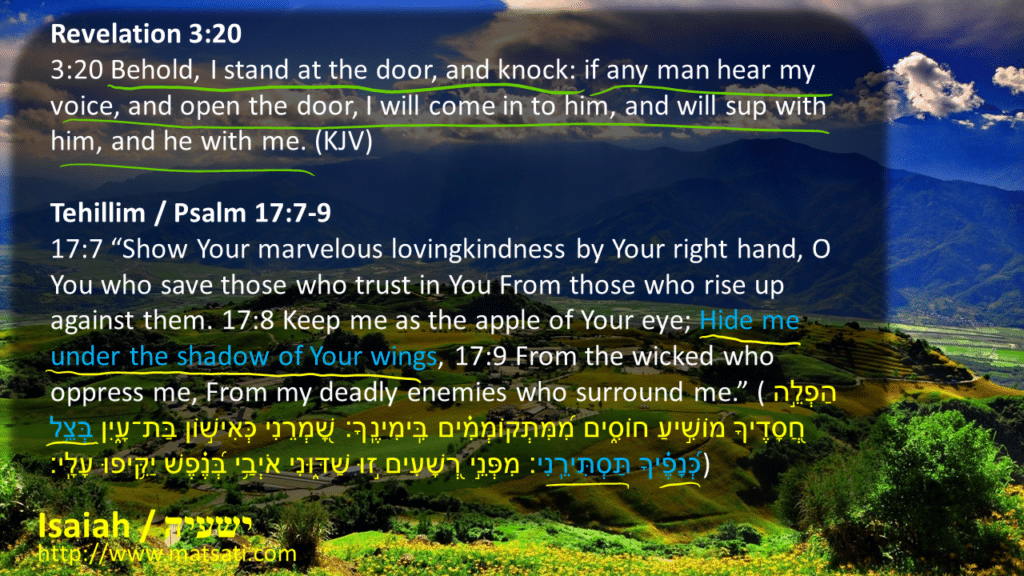
Revelation 3:20
3:20 Behold, I stand at the door, and knock: if any man hear my voice, and open the door, I will come in to him, and will sup with him, and he with me. (KJV)
Paul wrote according to Romans 10:8-17, specifically “For Isaiah says, ‘Lord, who has believed our report?’ So then faith comes by hearing, and hearing by the word of God.” Those who hear the voice of God and of His Messiah, are those who hear the Word of God preached, or read. Faith comes by hearing the Word of God. Doubt and unbelief come from listening to what the world has to say, the world’s opinions and ideas, liberal ideologies, and the lies of the evil one. Faith means simply ”believing, trusting, and living in a way that speaks to our faith, that God will do what He says He will do.” Our faith in God is built on what we know about Him and His plan for us and His will for our lives. This may have been one of the major issues with Judah and Jerusalem that the Word of God was not read, studied, or sought after, and so knowledge of the Lord was gone, and consequently what Paul says in Romans 10 couldn’t take place. These things underlay why God’s Word is so important for our lives.
ספר ישעיה פרק ח
ה וַיֹּסֶף יְהֹוָה דַּבֵּר אֵלַי עוֹד לֵאמֹר: ו יַעַן כִּי מָאַס הָעָם הַזֶּה אֵת מֵי הַשִּׁלֹחַ הַהֹלְכִים לְאַט וּמְשֹוֹשֹ אֶת-רְצִין וּבֶן-רְמַלְיָהוּ: ז וְלָכֵן הִנֵּה אֲדֹנָי מַעֲלֶה עֲלֵיהֶם אֶת-מֵי הַנָּהָר הָעֲצוּמִים וְהָרַבִּים אֶת-מֶלֶךְ אַשּׁוּר וְאֶת-כָּל-כְּבוֹדוֹ וְעָלָה עַל-כָּל-אֲפִיקָיו וְהָלַךְ עַל-כָּל-גְּדוֹתָיו:
Isaiah 8:5 states, “The LORD spake also unto me again, saying, (וַיֹּסֶף יְהֹוָה דַּבֵּר אֵלַי עוֹד לֵאמֹר)” Isaiah 8:6 “Forasmuch as this people refuseth the waters of Shiloah (יַעַן כִּי מָאַס הָעָם הַזֶּה אֵת מֵי הַשִּׁלֹחַ) that go softly, (הַהֹלְכִים לְאַט) and rejoice in Rezin and Remaliah’s son; (וּמְשֹוֹשֹ אֶת-רְצִין וּבֶן-רְמַלְיָהוּ)” Isaiah 8:7 “Now therefore, behold, the Lord bringeth up upon them the waters of the river, (וְלָכֵן הִנֵּה אֲדֹנָי מַעֲלֶה עֲלֵיהֶם אֶת-מֵי הַנָּהָר) strong and many, even the king of Assyria, (הָעֲצוּמִים וְהָרַבִּים אֶת-מֶלֶךְ אַשּׁוּר) and all his glory: and he shall come up over all his channels, (כָּל-כְּבוֹדוֹ וְעָלָה עַל-כָּל-אֲפִיקָיו) and go over all his banks: (וְהָלַךְ עַל-כָּל-גְּדוֹתָיו)” The comment יַעַן כִּי מָאַס הָעָם הַזֶּה אֵת מֵי הַשִּׁלֹחַ “Forasmuch as this people refuseth the waters of Shiloah” reminds us of the pool of Shiloam (בריכת השילוח). The pool was fed by the waters of the Gihon, carried there by the Siloam tunnel that was built under Hezekiah’s reign. The word הַשִּׁלֹחַ occurs 9 times written this way. The verse in which this word is used as a Messianic Expectation was when Jacob was blessing each of his children before he died in Bereshit /Genesis 49:10 “The scepter shall not depart from Judah, nor a Lawgiver from between his feet, until Shiloh come. And the obedience of the peoples to him. (NKJV)” Jacob’s blessing includes the descendents of Judah being strong and receiving the praise of the other tribes of Israel (Bereshit / Genesis 49:8-9). This was fulfilled in the days of David, who was a mighty warrior and king, and the promise was that through him the Messiah would come. When the Messiah Yeshua came, the scepter to rule was in his hands, never to depart from Judah as he remains a Jewish man from the tribe of Judah, and as King of kings and Lord of Lords he remains in power even up until this day! Yeshua is the teacher of Torah, of truth, of righteousness and holiness, according to God’s holy word.
Looking at Isaiah 8:6-7 we see God’s faithfulness in the waters of Shiloah, as the Lord continued to provide drink for the people in the city which was under siege. Even though they have this blessing, they trust in Assyria, therefore this prophetic son who is named מַהֵר שָׁלָל חָשׁ בַּז Maher-shalal-hash-baz “hurry to booty, speedy to spoils” this prophecy against Syria and Ephraim will turn against them as well. Commentators believe that there is some time between the birth of עִמָּ֥נוּ אֵֽל (Emmanuel) and מַהֵר שָׁלָל חָשׁ בַּז Maher-shalal-hash-baz. Others believe this is one and the same child. The phrase וּמְשֹוֹשֹ אֶת-רְצִין וּבֶן-רְמַלְיָהוּ “and rejoice in Rezin and Remaliah’s son” may indicate the timeframe of the writing of this prophecy, following 734 BC when Tiglath-pileser’s campaign had forced Syria and Ephraim to withdraw from Jerusalem.
Isaiah 8:7 ז וְלָכֵן הִנֵּה אֲדֹנָי מַעֲלֶה עֲלֵיהֶם אֶת-מֵי הַנָּהָר הָעֲצוּמִים וְהָרַבִּים אֶת-מֶלֶךְ אַשּׁוּר וְאֶת-כָּל-כְּבוֹדוֹ וְעָלָה עַל-כָּל-אֲפִיקָיו וְהָלַךְ עַל-כָּל-גְּדוֹתָיו “Now therefore, behold, the Lord bringeth up upon them the waters of the river, strong and many, even the king of Assyria, and all his glory: and he shall come up over all his channels, and go over all his banks.” We are told how the Lord is raising up a mighty river, analogizing this to the nation and warriors of Assyria. The prophecy draws upon the idea of flood waters that come when one is unaware to be utterly destroyed. The river has the power to sweep away everything, man, woman, child, house, and beast. There is a parallel to Parashat Korach when the ground opened up and swallowed everything, just like we can see here in the analogy of the river, death and destruction, descending into hell due to pride and sin. For those who trust in the Lord, these things do not happen! This phrase וּמְשׂ֥וֹשׂ אֶת־רְצִ֖ין וּבֶן־רְמַלְיָֽהוּ we note that מְשׂ֥וֹשׂ is a noun, common, singular, construct meaning “joy” and the direct object אֶת identifies the source of their joy, that of Rezin and the son of Remaliah. Again, this joy is not in the Lord God of Israel, but in their agreement with Assyria. This draws in the concept of pride as their delivery was due to their own wisdom and cunning diplomacy as opposed to the God in heaven who is their protection. This same river that overtook their enemies will also overtake them due to their misguided allegiances.
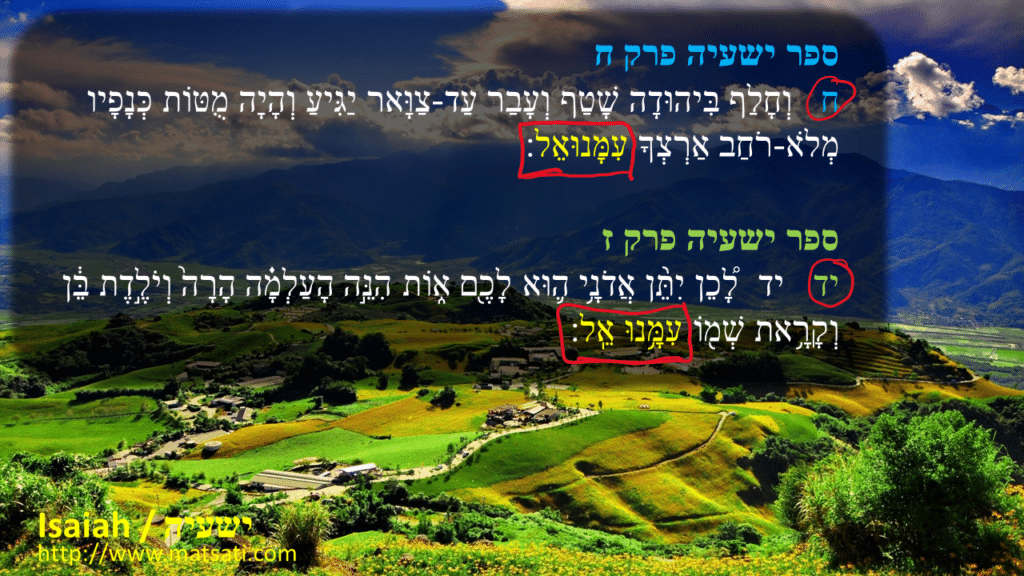
ספר ישעיה פרק ח
ח וְחָלַף בִּיהוּדָה שָׁטַף וְעָבַר עַד-צַוָּאר יַגִּיעַ וְהָיָה מֻטּוֹת כְּנָפָיו מְלֹא-רֹחַב אַרְצְךָ עִמָּנוּאֵל:
Isaiah 8:8 states, “And he shall pass through Judah; (וְחָלַף בִּיהוּדָה) he shall overflow and go over, he shall reach even to the neck; (שָׁטַף וְעָבַר עַד-צַוָּאר יַגִּיעַ) and the stretching out of his wings (וְהָיָה מֻטּוֹת כְּנָפָיו) shall fill the breadth of thy land, O Immanuel. (מְלֹא-רֹחַב אַרְצְךָ עִמָּנוּאֵל)” Here the prophecy becomes clear, this flood will go through Judah and overtake her. It is interesting comparing Isaiah 7:14 to 8:8 Emmanuel is mentioned.
ספר ישעיה פרק ז
יד לָ֠כֵן יִתֵּ֨ן אֲדֹנָ֥י ה֛וּא לָכֶ֖ם א֑וֹת הִנֵּ֣ה הָעַלְמָ֗ה הָרָה֙ וְיֹלֶ֣דֶת בֵּ֔ן וְקָרָ֥את שְׁמ֖וֹ עִמָּ֥נוּ אֵֽל
Here in Isaiah 8:8, Emmanuel (עִמָּנוּאֵל) is spelled as one word, whereas in Isaiah 7:14 it is spelled as two separate words (עִמָּ֥נוּ אֵֽל). The differences here could be simply referring to the God who is with us, his wings are spread as broad as the land, there is no escaping His power and might. The LHB combining these words to make one-word עִמָּנוּאֵל (Emmanuel) suggests this has become the name of the child. Looking at Ginsburg’s MSS we find separate words on 7:14, however there is a note in the marginal masorah and indicates there are some MSS that write as joined words, the two sources are according to the Complutensian polyglot and second edition of rabbinic Bible. The polyglot and rabbinic Bibles are later copies of the biblical text. So, it seems like this is really a typesetting issue in Isaiah 7:14 and 8:8 where the original is separated words. Ginsburg’s MSS on Isaiah 8:8 actually show the words Emmanuel (עִמָּ֥נוּ אֵֽל) as separate words contrary to what the LHB is showing. In addition, Ginsburg also shows no note on Isaiah 8:8 on these words. So, it is likely this is simply an issue of typesetting according to the LHB, Complutensian polyglot, and second edition of rabbinic Bibles. Noticing these differences are very important for us to know, why do you think that is? The most interesting outcome of this observation on the biblical text writing as עִמָּנוּאֵל verses עִמָּ֥נוּ אֵֽל, provides us with an answer to anti-missionaries. Based upon the LHB translation, it is possible for the anti-missionary to deceive someone saying that the Messiah spoken of here must be named עִמָּנוּאֵל Emmanuel and not Yeshua, and so Yeshua could not be the Messiah. The point of this insight is that Ginsburg’s MSS attests that the writing of the words together עִמָּנוּאֵל is actually a typesetting issue in the LHB and does not provide a proof for the name of the Messiah being עִמָּנוּאֵל Emmanuel. These words עִמָּ֥נוּ אֵֽל were originally written separately in both Isaiah 7:14 and 8:8! Our conclusion is “Yeshua Hu Hamoshiakh!” (Yeshua he is the Messiah!)
The idea of the flood going up to the neck, this parallels the idea of coming near to death. The promise of God is coupled here from the sense of not bringing Judah to utter destruction. There are many examples from the Scriptures that speak of the wings of God, for example from Tehillim / Psalms 17, 91, and Ruth 2.
Tehillim / Psalm 17:7-9
17:7 “Show Your marvelous lovingkindness by Your right hand, O You who save those who trust in You From those who rise up against them. 17:8 Keep me as the apple of Your eye; Hide me under the shadow of Your wings, 17:9 From the wicked who oppress me, From my deadly enemies who surround me.” (הַפְלֵ֣ה חֲ֭סָדֶיךָ מוֹשִׁ֣יעַ חוֹסִ֑ים מִ֝מִּתְקוֹמְמִ֗ים בִּֽימִינֶֽךָ׃ שָׁ֭מְרֵנִי כְּאִישׁ֣וֹן בַּת־עָ֑יִן בְּצֵ֥ל כְּ֝נָפֶ֗יךָ תַּסְתִּירֵֽנִי׃ מִפְּנֵ֣י רְ֭שָׁעִים ז֣וּ שַׁדּ֑וּנִי אֹיְבַ֥י בְּ֝נֶ֗פֶשׁ יַקִּ֥יפוּ עָלָֽי׃)
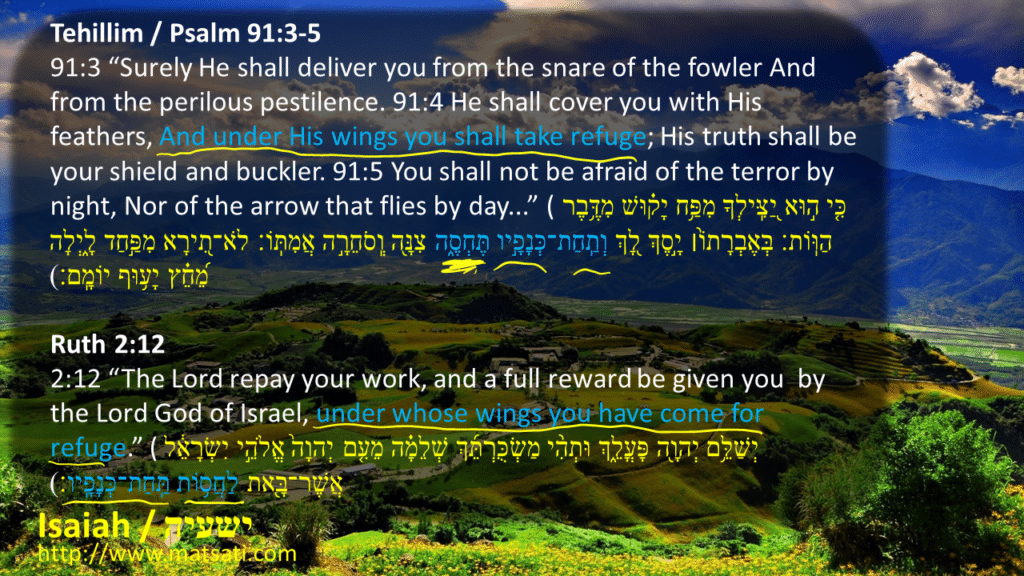
Tehillim / Psalm 91:3-5
91:3 “Surely He shall deliver you from the snare of the fowler And from the perilous pestilence. 91:4 He shall cover you with His feathers, And under His wings you shall take refuge; His truth shall be your shield and buckler. 91:5 You shall not be afraid of the terror by night, Nor of the arrow that flies by day…” (כִּ֤י ה֣וּא יַ֭צִּֽילְךָ מִפַּ֥ח יָק֗וּשׁ מִדֶּ֥בֶר הַוּֽוֹת׃ בְּאֶבְרָתוֹ֨׀ יָ֣סֶךְ לָ֭ךְ וְתַֽחַת־כְּנָפָ֣יו תֶּחְסֶ֑ה צִנָּ֖ה וְֽסֹחֵרָ֣ה אֲמִתּֽוֹ׃ לֹא־תִ֭ירָא מִפַּ֣חַד לָ֑יְלָה מֵ֝חֵ֗ץ יָע֥וּף יוֹמָֽם׃)
Ruth 2:12
2:12 “The Lord repay your work, and a full reward be given you by the Lord God of Israel, under whose wings you have come for refuge.” (יְשַׁלֵּ֥ם יְהוָ֖ה פָּעֳלֵ֑ךְ וּתְהִ֨י מַשְׂכֻּרְתֵּ֜ךְ שְׁלֵמָ֗ה מֵעִ֤ם יְהוָה֙ אֱלֹהֵ֣י יִשְׂרָאֵ֔ל אֲשֶׁר־בָּ֖את לַחֲס֥וֹת תַּֽחַת־כְּנָפָֽיו׃)
In Tehillim / Psalms 17:8, David says בְּצֵ֥ל כְּ֝נָפֶ֗יךָ תַּסְתִּירֵֽנִי “in the shadow of your wings hide me.” In Tehillim / Psalms 91:4, David says וְתַֽחַת־כְּנָפָ֣יו תֶּחְסֶ֑ה the verb תֶּחְסֶ֑ה is written in the Qal vayiqtol imperative second person, “you will take refuge” under (תַֽחַת) his wings (כְּנָפָ֣יו). Naomi speaking to Ruth says, לַחֲס֥וֹת תַּֽחַת־כְּנָפָֽיו “under his wings you have come for refuge.” Each of these describes the concept of being under the wings of God, as a mother takes care of her young. Note an interesting connection here to the wings of God according to these sources, Matthew 9:20, Mark 5:25, Mark 6:56, and Luke 8:43-44.
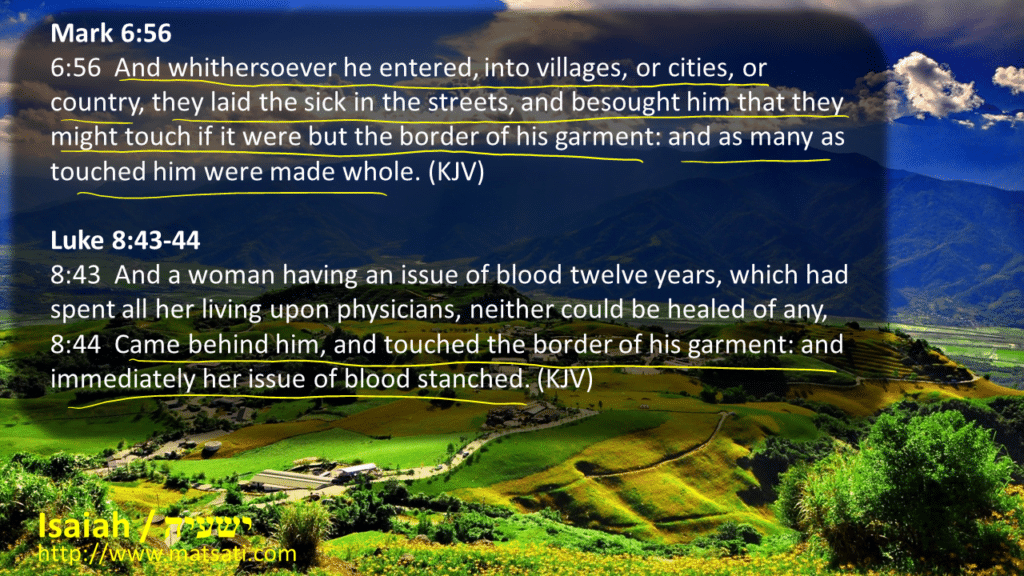
Mark 6:56
6:56 And whithersoever he entered, into villages, or cities, or country, they laid the sick in the streets, and besought him that they might touch if it were but the border of his garment: and as many as touched him were made whole. (KJV)
Luke 8:43-44
8:43 And a woman having an issue of blood twelve years, which had spent all her living upon physicians, neither could be healed of any, 8:44 Came behind him, and touched the border of his garment: and immediately her issue of blood stanched. (KJV)
We note that according to Mark this idea of touching the border of the garment was a practice that was taking place for people to be healed, this was not something that was innovative by the woman with the issue of blood. The one with the issue of blood however is the most famous passage whereby we remember this miracle. The question may be asked: “why did the people of the first century believe touching the fringes led to healing?” It is interesting that the word for the fringes in Greek is κρασπεδου (kraspedon), the same word is used in the LXX for the Hebrew word tzitzit (ציצית, see Bamidbar / Numbers 15:38). The point is that the people were actually touching the tzitzit on the corners of Yeshua’s clothes which are representative of the commandments of God.
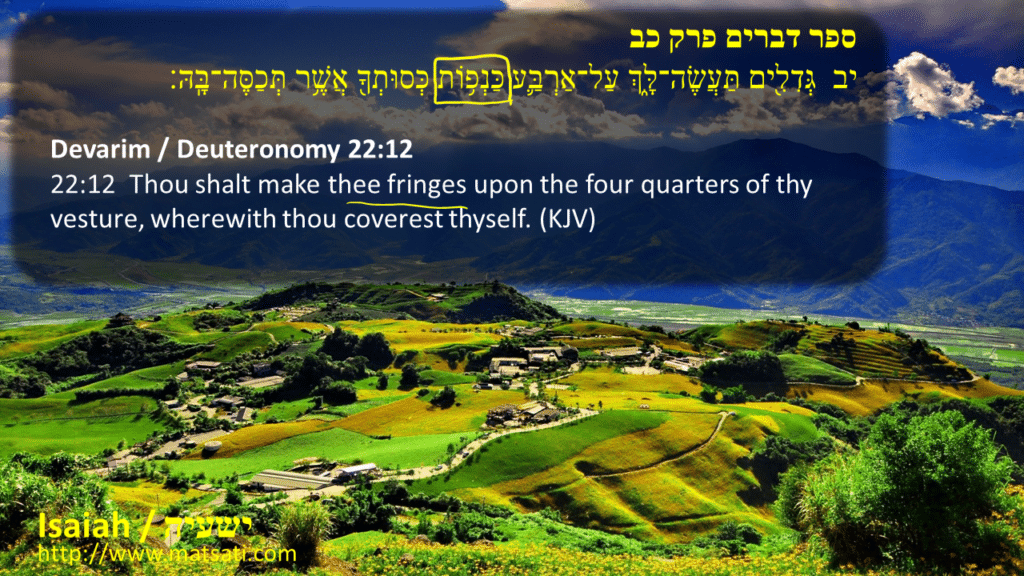
ספר דברים פרק כב
יב גְּדִלִ֖ים תַּעֲשֶׂה־לָּ֑ךְ עַל־אַרְבַּ֛ע כַּנְפ֥וֹת כְּסוּתְךָ֖ אֲשֶׁ֥ר תְּכַסֶּה־בָּֽהּ׃
Devarim / Deuteronomy 22:12
22:12 Thou shalt make thee fringes upon the four quarters of thy vesture, wherewith thou coverest thyself. (KJV)
Notice here that the “quarters” or “corners” are described as כַּנְפ֥וֹת “wings” detailing how the commandments illustrated by the tzitzit are connected to the four corners. Today this is known as a tallit (טַלִּית). We note the biblical prophecy from Malachai 4:2 “But for you who fear my name, the servant of righteousness shall rise with healing in the corners (of his garment).” We note that the people of the first century were waiting on the Messiah to come with healing in his wings according to Malachai. This is a significant aspect of the context of Isaiah 7 and 8 in relation to Emmanuel, the child that will be born. The point of Isaiah 8:8, וְחָלַף בִּיהוּדָה שָׁטַף וְעָבַר עַד-צַוָּאר יַגִּיעַ וְהָיָה מֻטּוֹת כְּנָפָיו מְלֹא-רֹחַב אַרְצְךָ עִמָּנוּאֵל “And he shall pass through Judah; he shall overflow and go over, he shall reach even to the neck; and the stretching out of his wings shall fill the breadth of thy land, O Immanuel” is that this flood warriors will come but will fall short of total destruction. God’s promises will be kept to Abraham, and these things illustrate the love that God has for His people. And if the people would repent and turn from their evil ways, the Lord would bring healing to their land and protection from their enemies. The last word of the verse in Isaiah 8:8 mentioning עִמָּנוּאֵל suggests that this attack from the nations is against Emmanuel as the leader of God’s people who was to deliver the nation from her enemies. The point is that this context suggests that this Emmanuel cannot be a reference to Isaiah’s son, or even to some unknown son of Ahaz. This context forces the interpretation of the Messianic Expectation, to be referring to the Messiah. This draws in the nature of God’s Messiah, as knowing him we know the Father who is in heaven, and that it is in the Messiah that all hope resides! In the Messiah, God is with us! These are the things that Yeshua taught us according to the book of John chapter 14 and elsewhere.
ספר ישעיה פרק ח
ט רֹעוּ עַמִּים וָחֹתּוּ וְהַאֲזִינוּ כֹּל מֶרְחַקֵּי-אָרֶץ הִתְאַזְּרוּ וָחֹתּוּ הִתְאַזְּרוּ וָחֹתּוּ: י עֻצוּ עֵצָה וְתֻפָר דַּבְּרוּ דָבָר וְלֹא יָקוּם כִּי עִמָּנוּ אֵל:
Isaiah 8:9 states, “Associate yourselves, O ye people, (רֹעוּ עַמִּים) and ye shall be broken in pieces; (וָחֹתּוּ) and give ear, all ye of far countries: (וְהַאֲזִינוּ כֹּל מֶרְחַקֵּי-אָרֶץ) gird yourselves, (הִתְאַזְּרוּ) and ye shall be broken in pieces; gird yourselves, and ye shall be broken in pieces. (וָחֹתּוּ הִתְאַזְּרוּ וָחֹתּוּ)” Isaiah 8:10 “Take counsel together, (עֻצוּ עֵצָה) and it shall come to nought; (וְתֻפָר) speak the word, (דַּבְּרוּ דָבָר) and it shall not stand: for God is with us. (וְלֹא יָקוּם כִּי עִמָּנוּ אֵל)” Note how the context changes from Judah to the nations. This idea וְהַאֲזִינוּ כֹּל מֶרְחַקֵּי-אָרֶץ הִתְאַזְּרוּ וָחֹתּוּ “and give ear, all ye of far countries: gird yourselves, and ye shall be broken in pieces” appears that Emmanuel will turn the tables on the nations in their pride to overtake God’s people. We observe the historical narrative perspective, the Peshat, it was because of Israel’s sins that caused her enemies to come upon her and destroy and kill. We note that sin allows the enemy to come in and wreak havoc in our lives! From the sense of girding one’s self (הִתְאַזְּרוּ) there are a couple of scenarios. The first is that of preparing for war according to Devarim / Deuteronomy 1:41, 1 Samuel 17:38, 25:13, 2 Samuel 21:16, 1 Kings 20:11, Tehillim / Psalms 45:4/3, girding the sword. On the other hand, there is the concept of girding loins in preparation for action according to Shemot / Exodus 12:11, 2 Kings 4:29, 9:1, Job 38:3, 40:7, Mishley / Proverbs 31:17, Jermiah 1:17, 1 Peter 1:13.
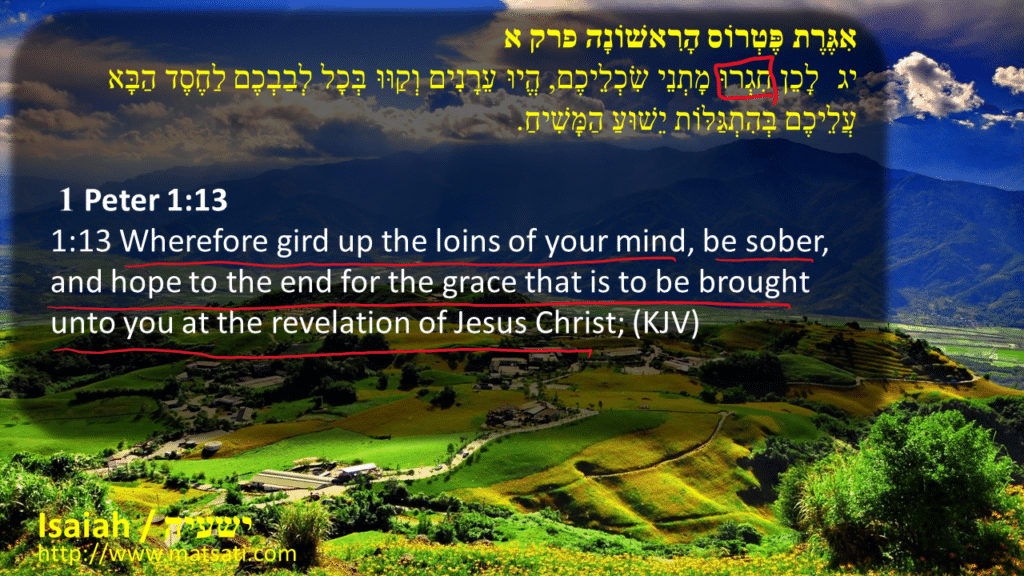
אִגֶּרֶת פֶּטְרוֹס הָרִאשׁוֹנָה פרק א
יג לָכֵן חִגְרוּ מָתְנֵי שִׂכְלֵיכֶם, הֱיוּ עֵרָנִים וְקַוּוּ בְּכָל לְבַבְכֶם לַחֶסֶד הַבָּא עֲלֵיכֶם בְּהִתְגַּלּוֹת יֵשׁוּעַ הַמָּשִׁיחַ.
1 Peter 1:13
1:13 Wherefore gird up the loins of your mind, be sober, and hope to the end for the grace that is to be brought unto you at the revelation of Jesus Christ; (KJV)
We note in 1 Peter 1:13 the Greek word here ἀναζώννυμι means “to gird afresh, gird up” and the Hebrew equivalent חָגַר meaning “to gird on (as a belt, armor, etc.).” The point is that we are called to prepare, to watch, actions that signify our willingness to listen to the Lord and live our lives in faithfulness to His holy words. We note that this indicated to us our deliverance is by the power of God and our willingness to submit our lives to Him, to His Messiah, and to His holy Word. We note what Peter writes in his epistle explaining that Judgment begins at the house of God. (1 Peter 4:17). The people in this time were facing persecution for their faith and struggling to separate themselves from the way of the world and their former sins. Peter reminds the people that the wicked will face judgment (1 Peter 4:5) and how God’s people who are in the Messiah Yeshua are held to a higher standard. (1 Peter 4:12) Note Isaiah is explaining to us that judgment is unto salvation when God is with us! This appears to be what Isaiah says in Isaiah 8:10 “Take counsel together, (עֻצוּ עֵצָה) and it shall come to naught; (וְתֻפָר) speak the word, (דַּבְּרוּ דָבָר) and it shall not stand: for God is with us. (וְלֹא יָקוּם כִּי עִמָּנוּ אֵל)” Throughout the history of Israel we are given the solution to all of our troubles, that solution is to turn to the Lord, to seek Him and His Messiah, and to draw near to the Lord in His Word, and by faith He will cause his presence to dwell in our midst! We note that by the sending of God’s Messiah, His only begotten son (John 3:16), He makes fellowship between us and Him possible. Through faith in Yeshua, we can have eternal life, and peace that surpasses all understanding!
Rabbinic Literature on Isaiah 8:1-10
The Targum Jonathan interprets the book of Isaiah in the following way:
תרגום יונתן בן עוזיאל אל ישעיה פרק ח:א-י
א וַאֲמַר יְיָ לִי סַב לָךְ לוּחַ רַב וּכְתוֹב עֲלוֹהִי כְּתַב מְפָרַשׁ מוֹחִי לְמִבַּז בִּזָא וּלְמֶעְדֵי עֲדָאָה: ב וְאַסְהֵיד קֳדָמַי סְהִידִין מְהֵמְנָן יַת לְוָטַיָא דַאֲמָרִית לְאַיְתָאָה בִּנְבוּאַת אוּרִיָה כַהֲנָא וְהָא אֲתוֹ אַף כֵּן כָּל נְחָמָתָא דַאֲמָרֵית לְאַיְתָאָה בִּנְבוּאַת זְכַרְיָה בַּר יְבָרֶכְיָה אֲנָא עֲתִיד לְאַיְתָאָה: ג וַעֲלֵית לְוַת נְבִיאֲתָא וְעַדִיאַת וִילֵדַת בַּר וַאֲמַר יְיָ לִי קְרִי שְׁמֵיהּ מוֹחִי לְמִבַּז בִּזָא וּלְמֶעְדֵי עֲדָאָה: ד אֲרֵי עַד לָא יְדַע עוּלֵימָא מִקְרֵי אַבָּא וְאִמָא יִשְׁבֵי יַת נִכְסֵי דַמֶשֶׂק וְיַת עֲדָאֵי שֹׁמְרוֹן קֳדָם מַלְכָּא דְאַתּוּר: ה וְאוֹסִיף מֵימְרָא דַייָ לְמַלָלָא עִמִי עוֹד לְמֵימָר: ו חֲלַף דְקָץ עַמָא הָדֵין בְּמַלְכוּתָא דְבֵית דָוִד דִמְדַבֵּר לְהוֹן בְּנִיחַ כְּמֵי שִׁלוּחָא דְנַגְדִין בְּנִיחַ וְאִתְרְעִיאוּ בִרְצִין וּבַר רְמַלְיָה: ז בְּכֵן הָא יְיָ מַיְתֵי וּמַסִיק עֲלֵיהוֹן יַת מַשִׁרְיַת עַמְמַיָא דְסַגִיאִין כְּמֵי נַהֲרָא תַּקִיפַיָא וַחֲסִינַיָא יַת מַלְכָּא דְאַתּוּר וְיַת כָּל מַשִׁרְיָתֵיהּ וְיִסַק עַל כָּל פַּצִידוֹהִי וִיהַךְ עַל כָּל כֵּיפוֹהִי: ח וְיַעְדֵי בְאַרְעָא דְבֵית יְהוּדָה כְּנַחַל מְגַבֵּר עַד יְרוּשְׁלֵם יִמְטֵי וִיהֵי עַם מַשִׁרְיָתֵיהּ מָלֵי פְתָאֵי אַרְעָךְ עִמָנוּ אֵל: ט אִתְחַבָּרוּ עַמְמַיָא וְאִתְבָּרוּ וְאָצִיתוּ כֹּל דִי בִסְיָפֵי אַרְעָא אַתְקִיפוּ וְאִתְבָּרוּ אַתְקִיפוּ וְאִתְבָּרוּ: י אִתְמְלִיכוּ מְלַךְ וְיַעֲדֵי מַלִלוּ פִּתְגָמָא וְלָא יִתְקַיֵם אֲרֵי בְסַעֲדָנָא אֱלָהָא:
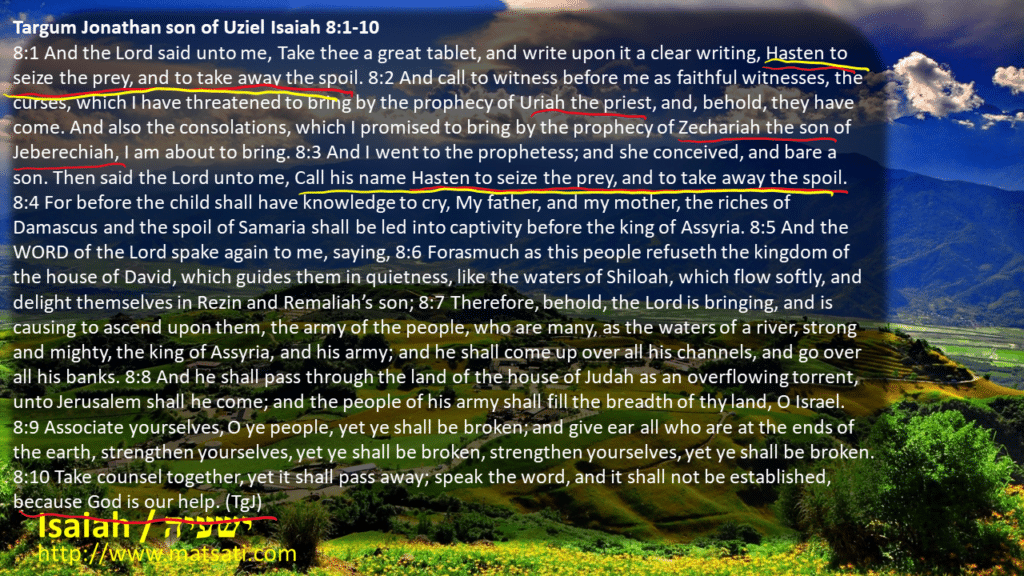
Targum Jonathan son of Uziel Isaiah 8:1-10
8:1 And the Lord said unto me, Take thee a great tablet, and write upon it a clear writing, Hasten to seize the prey, and to take away the spoil. 8:2 And call to witness before me as faithful witnesses, the curses, which I have threatened to bring by the prophecy of Uriah the priest, and, behold, they have come. And also the consolations, which I promised to bring by the prophecy of Zechariah the son of Jeberechiah, I am about to bring. 8:3 And I went to the prophetess; and she conceived, and bare a son. Then said the Lord unto me, Call his name Hasten to seize the prey, and to take away the spoil. 8:4 For before the child shall have knowledge to cry, My father, and my mother, the riches of Damascus and the spoil of Samaria shall be led into captivity before the king of Assyria. 8:5 And the WORD of the Lord spake again to me, saying, 8:6 Forasmuch as this people refuseth the kingdom of the house of David, which guides them in quietness, like the waters of Shiloah, which flow softly, and delight themselves in Rezin and Remaliah’s son; 8:7 Therefore, behold, the Lord is bringing, and is causing to ascend upon them, the army of the people, who are many, as the waters of a river, strong and mighty, the king of Assyria, and his army; and he shall come up over all his channels, and go over all his banks. 8:8 And he shall pass through the land of the house of Judah as an overflowing torrent, unto Jerusalem shall he come; and the people of his army shall fill the breadth of thy land, O Israel. 8:9 Associate yourselves, O ye people, yet ye shall be broken; and give ear all who are at the ends of the earth, strengthen yourselves, yet ye shall be broken, strengthen yourselves, yet ye shall be broken. 8:10 Take counsel together, yet it shall pass away; speak the word, and it shall not be established, because God is our help. (TgJ)
Jonathan opens with the following translation of Isaiah 8:1, א וַאֲמַר יְיָ לִי סַב לָךְ לוּחַ רַב וּכְתוֹב עֲלוֹהִי כְּתַב מְפָרַשׁ מוֹחִי לְמִבַּז בִּזָא וּלְמֶעְדֵי עֲדָאָה: 8:1 And the Lord said unto me, Take thee a great tablet, and write upon it a clear writing, Hasten to seize the prey, and to take away the spoil. (TgJ) It is interesting that TgJ actually translates the name Maher-shalal-hash-baz. (וּכְתֹב עָלָיו בְּחֶרֶט אֱנוֹשׁ לְמַהֵר שָׁלָל חָשׁ בַּז) as opposed to transliterating the name as he does with עִמָּ֥נוּ אֵֽל (Emmanuel). Could it be that TgJ does not understand this verse to be the name of a child of the prophet Isaiah, but that of having prophetic meaning to destruction, prey, and spoil? This is how Rashi sees the verse saying the following:
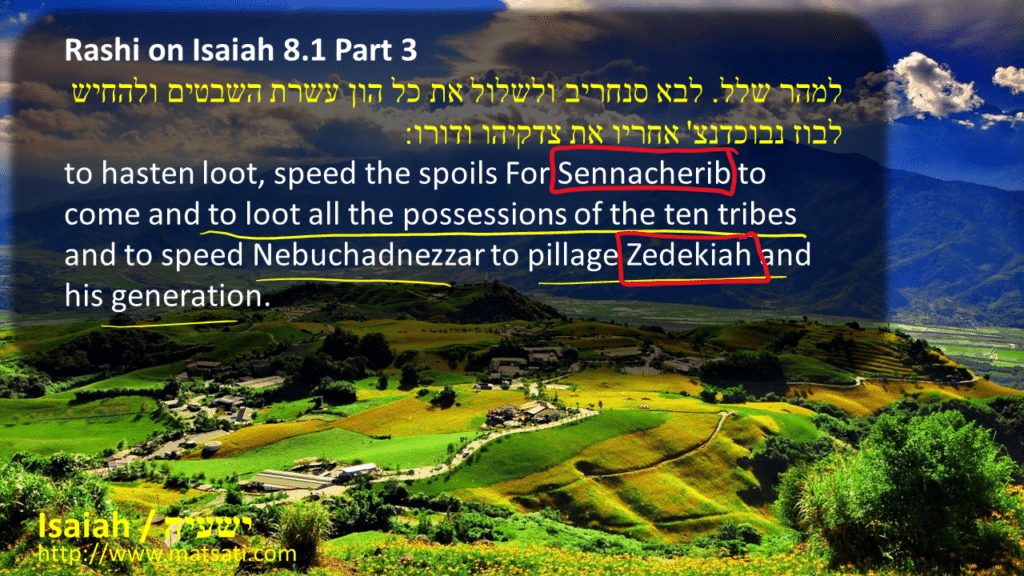
Rashi on Isaiah 8.1 Part 3
למהר שלל. לבא סנחריב ולשלול את כל הון עשרת השבטים ולהחיש לבוז נבוכדנצ’ אחריו את צדקיהו ודורו:
to hasten loot, speed the spoils For Sennacherib to come and to loot all the possessions of the ten tribes and to speed Nebuchadnezzar to pillage Zedekiah and his generation.
Here Rashi interprets these words Maher-shalal-hash-baz. (וּכְתֹב עָלָיו בְּחֶרֶט אֱנוֹשׁ לְמַהֵר שָׁלָל חָשׁ בַּז) as referring to Sennacherib looting the northern tribes of Israel, and Zedekiah is mentioned to include the southern tribe of Judah and Benjamin through looting via Nebuchadnezzar.
Isaiah 8:2-6 states the following, ב וְאַסְהֵיד קֳדָמַי סְהִידִין מְהֵמְנָן יַת לְוָטַיָא דַאֲמָרִית לְאַיְתָאָה בִּנְבוּאַת אוּרִיָה כַהֲנָא וְהָא אֲתוֹ אַף כֵּן כָּל נְחָמָתָא דַאֲמָרֵית לְאַיְתָאָה בִּנְבוּאַת זְכַרְיָה בַּר יְבָרֶכְיָה אֲנָא עֲתִיד לְאַיְתָאָה: 8:2 And call to witness before me as faithful witnesses, the curses, which I have threatened to bring by the prophecy of Uriah the priest, and, behold, they have come. And also the consolations, which I promised to bring by the prophecy of Zechariah the son of Jeberechiah, I am about to bring. ג וַעֲלֵית לְוַת נְבִיאֲתָא וְעַדִיאַת וִילֵדַת בַּר וַאֲמַר יְיָ לִי קְרִי שְׁמֵיהּ מוֹחִי לְמִבַּז בִּזָא וּלְמֶעְדֵי עֲדָאָה: 8:3 And I went to the prophetess; and she conceived, and bare a son. Then said the Lord unto me, Call his name Hasten to seize the prey, and to take away the spoil. ד אֲרֵי עַד לָא יְדַע עוּלֵימָא מִקְרֵי אַבָּא וְאִמָא יִשְׁבֵי יַת נִכְסֵי דַמֶשֶׂק וְיַת עֲדָאֵי שֹׁמְרוֹן קֳדָם מַלְכָּא דְאַתּוּר: 8:4 For before the child shall have knowledge to cry, My father, and my mother, the riches of Damascus and the spoil of Samaria shall be led into captivity before the king of Assyria. ה וְאוֹסִיף מֵימְרָא דַייָ לְמַלָלָא עִמִי עוֹד לְמֵימָר: 8:5 And the WORD of the Lord spake again to me, saying, ו חֲלַף דְקָץ עַמָא הָדֵין בְּמַלְכוּתָא דְבֵית דָוִד דִמְדַבֵּר לְהוֹן בְּנִיחַ כְּמֵי שִׁלוּחָא דְנַגְדִין בְּנִיחַ וְאִתְרְעִיאוּ בִרְצִין וּבַר רְמַלְיָה: 8:6 Forasmuch as this people refuseth the kingdom of the house of David, which guides them in quietness, like the waters of Shiloah, which flow softly, and delight themselves in Rezin and Remaliah’s son; (TgJ) It is interesting that TgJ makes a reference to the Torah according to Devarim / Deuteronomy speaking of the curses as a witness and testimony to Judah and Jerusalem. We remember that Uriah is a prophet mentioned in the Book of Jeremiah. He is described as being the son of Shemaiah from Kiriath-Jearim. During the reign of Jehoiakim, king of Judah, he fled into Egypt from the cruelty of the king but having been brought back he was beheaded and his body “cast into the graves of the common people.” He is mentioned in Jeremiah 26:20-23.
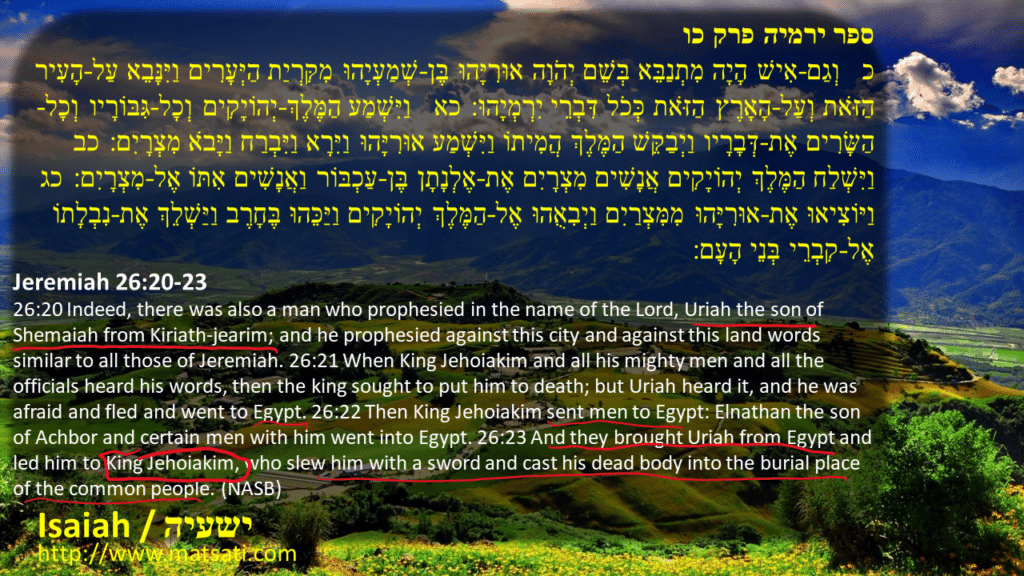
ספר ירמיה פרק כו
כ וְגַם-אִישׁ הָיָה מִתְנַבֵּא בְּשֵׁם יְהֹוָה אוּרִיָּהוּ בֶּן-שְׁמַעְיָהוּ מִקִּרְיַת הַיְּעָרִים וַיִּנָּבֵא עַל-הָעִיר הַזֹּאת וְעַל-הָאָרֶץ הַזֹּאת כְּכֹל דִּבְרֵי יִרְמְיָהוּ: כא וַיִּשְׁמַע הַמֶּלֶךְ-יְהוֹיָקִים וְכָל-גִּבּוֹרָיו וְכָל-הַשָּׂרִים אֶת-דְּבָרָיו וַיְבַקֵּשׁ הַמֶּלֶךְ הֲמִיתוֹ וַיִּשְׁמַע אוּרִיָּהוּ וַיִּרָא וַיִּבְרַח וַיָּבֹא מִצְרָיִם: כב וַיִּשְׁלַח הַמֶּלֶךְ יְהוֹיָקִים אֲנָשִׁים מִצְרָיִם אֶת-אֶלְנָתָן בֶּן-עַכְבּוֹר וַאֲנָשִׁים אִתּוֹ אֶל-מִצְרָיִם: כג וַיּוֹצִיאוּ אֶת-אוּרִיָּהוּ מִמִּצְרַיִם וַיְבִאֻהוּ אֶל-הַמֶּלֶךְ יְהוֹיָקִים וַיַּכֵּהוּ בֶּחָרֶב וַיַּשְׁלֵךְ אֶת-נִבְלָתוֹ אֶל-קִבְרֵי בְּנֵי הָעָם:
Jeremiah 26:20-23
26:20 Indeed, there was also a man who prophesied in the name of the Lord, Uriah the son of Shemaiah from Kiriath-jearim; and he prophesied against this city and against this land words similar to all those of Jeremiah. 26:21 When King Jehoiakim and all his mighty men and all the officials heard his words, then the king sought to put him to death; but Uriah heard it, and he was afraid and fled and went to Egypt. 26:22 Then King Jehoiakim sent men to Egypt: Elnathan the son of Achbor and certain men with him went into Egypt. 26:23 And they brought Uriah from Egypt and led him to King Jehoiakim, who slew him with a sword and cast his dead body into the burial place of the common people. (NASB)
Jehoiakim was the eighteenth and third to the last king of Judah from 609 to 598 BC. He was the second son of king Josiah. Note how this king and the narrative in Jeremiah post dates Isaiah.
| PROPHET | NAME MEANS | PLACE OF ACTIVITY | APPROXIMATE TIME PERIOD** | SCRIPTURE | UNDER KINGS |
| ISAIAH | “Yahweh is salvation” | Judah | 739-685 BC | Isaiah 1:1, 6:1, 7:1, 20:1,Isaiah 36-39,Hebrews 11:37 | Uzziah Jotham Ahaz Hezekiah Manasseh |
| JEREMIAH | “Yahweh exalts” | Judah | 627-580 BC | Jeremiah 1:2-3, 3:6, 11:21-23, 21:1, 22:11, 24:1, 25:1-3, 25:8-12, 26:1, 27:1, etc.,Jeremiah 37-40,Jeremiah 52:31-33 | Josiah Jehoahaz Jehoiakim Jehoiachin Zedekiah |
| EZEKIEL | “Yahweh strengthens” | Babylon | 592-570 BC | Ezekiel 1:1-3, 24:1-2, 33:21 | Jehoiachin in exile |
| DANIEL | “Yahweh is my judge” | BabylonPersia | 606-530 BC | Daniel 1:1-7,Daniel 1-4,Daniel 5:1, 6:1, 10:1 | Nebuchadnezzar Belshazzar Darius Cyrus |
| HOSEA | “salvation” | Israel | 760-720 BC | Hosea 1:1 | Jeroboam II Zechariah Shallum Menahem Pekahiah Pekah Hoshea |
| JOEL | “Yahweh is God” | Judah | 830 BC? | (locust and Day of the Lord pictures in Joel) | Ahaziah? Joash? |
| AMOS | “burden bearer” | Israel | 760 BC | Amos 1:1, 7:12-17, 9:11-12 | Jeroboam II (Uzziah) |
| OBADIAH | “servant of Yahweh” | Judah? | 845 BC? | Obadiah 1-9 Jeremiah 49:7-162 Kings 8:20 | written against Edom which was enemy of Jerusalem under Jehoram |
| JONAH | “dove” | Israel(Nineveh) | 780-760 BC | 2 Kings 14:25,Jonah 1:1, 3:1 | Jeroboam II |
| MICAH | “Who is like Yahweh?” | Judah | 737-690 BC | Micah 1:1 | Jotham Ahaz Hezekiah |
| NAHUM | “comfort/consolation” | Judah | after 664 BCbefore 612 BC | Nahum 1:1(Fall of Nineveh) | Manasseh? Josiah? |
| HABAKKUK | “embracer” | Judah | 620-610 BC? | Habakkuk 1:6(Babylon) | Jehoiakim? |
| ZEPHANIAH | “Yahweh hides/treasures/protects” | Judah | 640-608 BC | Zephaniah 1:1 | Josiah |
| HAGGAI | “my feast/festival” | Judah (post-exile) | 520-516 BC | Haggai 1:1, 2:10, 2:20,Ezra 5-6 | Darius I Zerubbabel |
| ZECHARIAH | “Yahweh remembers” | Judah (post-exile) | 520-518 BC | Zechariah 1:1, 7:1Haggai 1:1 | Darius I Zerubbabel |
| MALACHI | “my messenger/angel” | Judah (post-exile) | 430 BC | Malachi 1:7-10, 3:1 | Artaxerxes I |
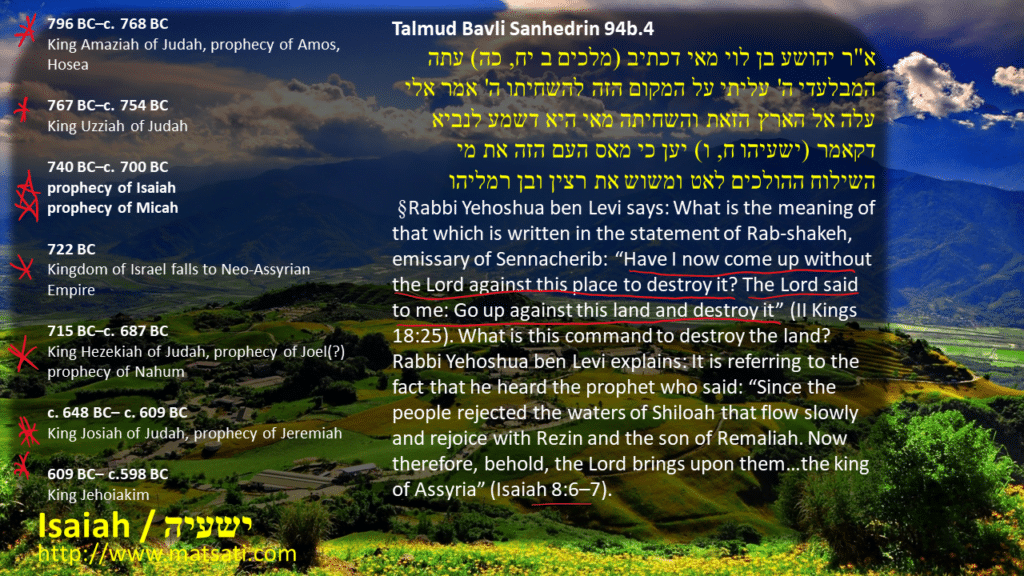
We note the following timeframe and how this fits into the narrative.
796 BC–c. 768 BC
King Amaziah of Judah
prophecy of Amos, Hosea
767 BC–c. 754 BC
King Uzziah of Judah
740 BC–c. 700 BC
prophecy of Isaiah
prophecy of Micah
722 BC
Kingdom of Israel falls to Neo-Assyrian Empire
715 BC–c. 687 BC
King Hezekiah of Judah
prophecy of Joel(?) prophecy of Nahum
c. 648 BC– c. 609 BC
King Josiah of Judah
prophecy of Jeremiah
609 BC– c.598 BC
King Jehoiakim
Granted there is a timespan of approximately 200 years through these prophets and kings in the timeframe of the prophets Isaiah and Jeremiah. This has led some commentators to question the narrative of Isaiah as having multiple redactors. We can’t neglect that this was a function of the inspiration of God for an event that is going to take place in the future. (The point is to err on the side of faith and not on the side of the lack of faith!) The Talmud states the following concerning these Scriptures (Isaiah 8:2-6).
Talmud Bavli Sanhedrin 94b.4
א”ר יהושע בן לוי מאי דכתיב (מלכים ב יח, כה) עתה המבלעדי ה’ עליתי על המקום הזה להשחיתו ה’ אמר אלי עלה אל הארץ הזאת והשחיתה מאי היא דשמע לנביא דקאמר (ישעיהו ח, ו) יען כי מאס העם הזה את מי השילוח ההולכים לאט ומשוש את רצין ובן רמליהו
§ Rabbi Yehoshua ben Levi says: What is the meaning of that which is written in the statement of Rab-shakeh, emissary of Sennacherib: “Have I now come up without the Lord against this place to destroy it? The Lord said to me: Go up against this land and destroy it” (II Kings 18:25). What is this command to destroy the land? Rabbi Yehoshua ben Levi explains: It is referring to the fact that he heard the prophet who said: “Since the people rejected the waters of Shiloah that flow slowly and rejoice with Rezin and the son of Remaliah. Now therefore, behold, the Lord brings upon them…the king of Assyria” (Isaiah 8:6–7).
Note that the emissary of Sennacherib is quoted as saying according to 2 Kings 18:25 “Furthermore, have I come to attack and destroy this place without word from the LORD? The LORD himself told me to march against this country and destroy it.” (NIV) It is interesting that even the enemy speaks prophetically of the Lord calling this distant nation to attack. This is due to the sins of the people, rejecting God’s holy and righteous ways, and walking in their own pride, serving idols, and forsaking God’s Word. The JPS footnotes on Isaiah 8:5 states the following concerning these things:
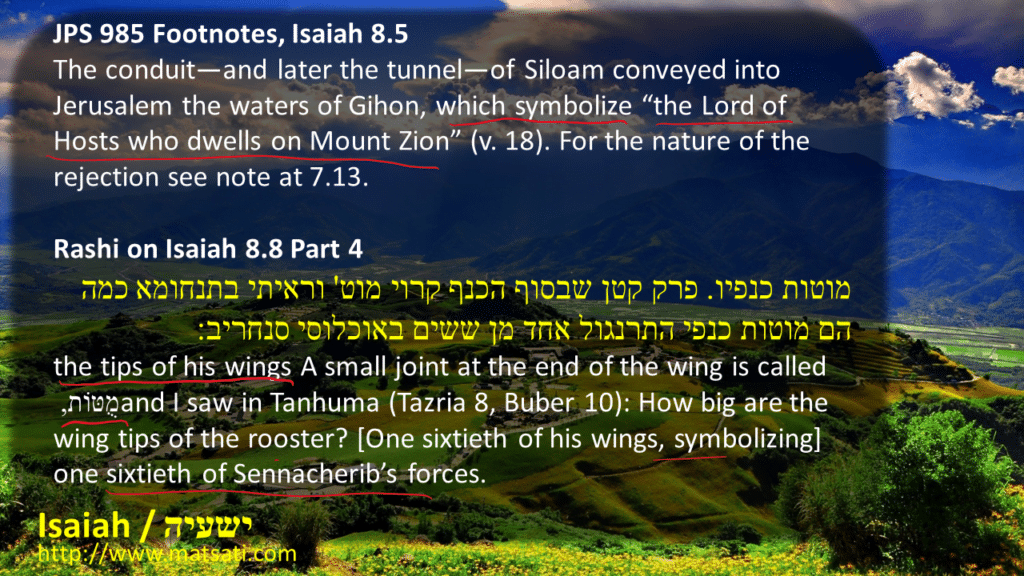
JPS 985 Footnotes, Isaiah 8.5
The conduit—and later the tunnel—of Siloam conveyed into Jerusalem the waters of Gihon, which symbolize “the Lord of Hosts who dwells on Mount Zion” (v. 18). For the nature of the rejection see note at 7.13.
The JPS concludes the waters that run from the spring into Jerusalem, the waters of Gihon symbolize the presence of God and that the people don’t recognize this fact. (This was taken for granted.) Could there be an application today for us, the food and water we have on our tables each day, how truly thankful are we each day for these things? We should be very thankful to the Lord God Almighty for His continued blessings on our lives.
Isaiah continues saying according to TgJ in Isaiah 8:7-8, ז בְּכֵן הָא יְיָ מַיְתֵי וּמַסִיק עֲלֵיהוֹן יַת מַשִׁרְיַת עַמְמַיָא דְסַגִיאִין כְּמֵי נַהֲרָא תַּקִיפַיָא וַחֲסִינַיָא יַת מַלְכָּא דְאַתּוּר וְיַת כָּל מַשִׁרְיָתֵיהּ וְיִסַק עַל כָּל פַּצִידוֹהִי וִיהַךְ עַל כָּל כֵּיפוֹהִי: 8:7 Therefore, behold, the Lord is bringing, and is causing to ascend upon them, the army of the people, who are many, as the waters of a river, strong and mighty, the king of Assyria, and his army; and he shall come up over all his channels, and go over all his banks. ח וְיַעְדֵי בְאַרְעָא דְבֵית יְהוּדָה כְּנַחַל מְגַבֵּר עַד יְרוּשְׁלֵם יִמְטֵי וִיהֵי עַם מַשִׁרְיָתֵיהּ מָלֵי פְתָאֵי אַרְעָךְ עִמָנוּ אֵל: 8:8 And he shall pass through the land of the house of Judah as an overflowing torrent, unto Jerusalem shall he come; and the people of his army shall fill the breadth of thy land, O Israel. (TgJ) Here TgJ provides a direct interpretation of Isaiah’s words stating the river Euphrates is an analogy to the army of Assyria. Rashi interprets Isaiah 8:8 saying:
Rashi on Isaiah 8.8 Part 4
מוטות כנפיו. פרק קטן שבסוף הכנף קרוי מוט’ וראיתי בתנחומא כמה הם מוטות כנפי התרנגול אחד מן ששים באוכלוסי סנחריב:
the tips of his wings A small joint at the end of the wing is called מֻטּוֹת, and I saw in Tanhuma (Tazria 8, Buber 10): How big are the wing tips of the rooster? [One sixtieth of his wings, symbolizing] one sixtieth of Sennacherib’s forces.
Rashi looks at Isaiah 8:8 and the word מֻטּוֹת כְּנָפָיו and relates the size of the wings and the connection to Sennacherib’s forces. The wings of a bird carries with it quite a few analogies, one is to being under the covering wing of God (Tehillim / Psalms 91:4), in His protection, another is to being carried like eagles wings out of Egypt (Shemot / Exodus 19:4), and the third is to cleanse of Metzora (Vayikra / Leviticus 14:1-9), all of these come from Torah examples. Note how significant the grouping of these concepts is as relating to the Messianic Expectation!
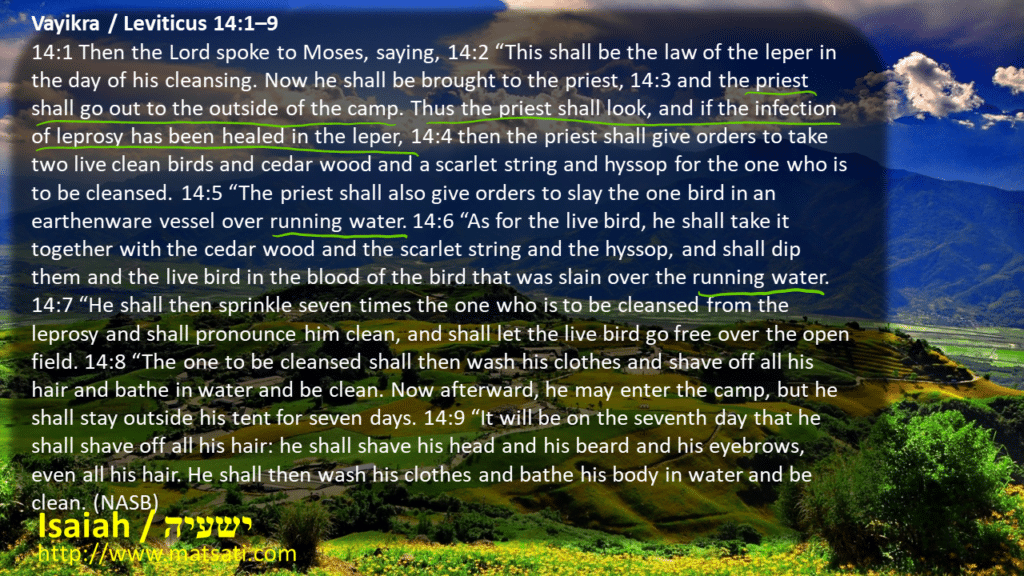
Vayikra / Leviticus 14:1–9
14:1 Then the Lord spoke to Moses, saying, 14:2 “This shall be the law of the leper in the day of his cleansing. Now he shall be brought to the priest, 14:3 and the priest shall go out to the outside of the camp. Thus the priest shall look, and if the infection of leprosy has been healed in the leper, 14:4 then the priest shall give orders to take two live clean birds and cedar wood and a scarlet string and hyssop for the one who is to be cleansed. 14:5 “The priest shall also give orders to slay the one bird in an earthenware vessel over running water. 14:6 “As for the live bird, he shall take it together with the cedar wood and the scarlet string and the hyssop, and shall dip them and the live bird in the blood of the bird that was slain over the running water. 14:7 “He shall then sprinkle seven times the one who is to be cleansed from the leprosy and shall pronounce him clean, and shall let the live bird go free over the open field. 14:8 “The one to be cleansed shall then wash his clothes and shave off all his hair and bathe in water and be clean. Now afterward, he may enter the camp, but he shall stay outside his tent for seven days. 14:9 “It will be on the seventh day that he shall shave off all his hair: he shall shave his head and his beard and his eyebrows, even all his hair. He shall then wash his clothes and bathe his body in water and be clean. (NASB)
In the process of the cleansing from Metzora, the wing tips are dipped into the blood along with the scarlet, hyssop, and cedar wood, and the blood is sprinkled over the one with Metzora and he is cleansed. Sifra, Metzora, Chapter 1.5 states the following regarding Vayikra / Leviticus 14.
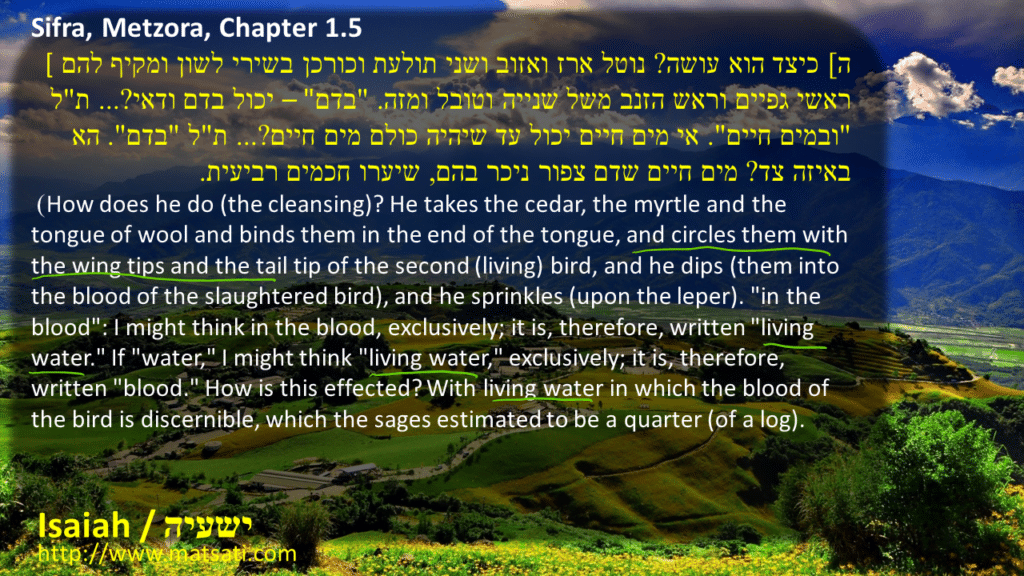
Sifra, Metzora, Chapter 1.5
[ה] כיצד הוא עושה? נוטל ארז ואזוב ושני תולעת וכורכן בשירי לשון ומקיף להם ראשי גפיים וראש הזנב משל שנייה וטובל ומזה. “בדם” – יכול בדם ודאי?… ת”ל “ובמים חיים”. אי מים חיים יכול עד שיהיה כולם מים חיים?… ת”ל “בדם”. הא באיזה צד? מים חיים שדם צפור ניכר בהם, שיערו חכמים רביעית.
5) How does he do (the cleansing)? He takes the cedar, the myrtle and the tongue of wool and binds them in the end of the tongue, and circles them with the wing tips and the tail tip of the second (living) bird, and he dips (them into the blood of the slaughtered bird), and he sprinkles (upon the leper). “in the blood”: I might think in the blood, exclusively; it is, therefore, written “living water.” If “water,” I might think “living water,” exclusively; it is, therefore, written “blood.” How is this effected? With living water in which the blood of the bird is discernible, which the sages estimated to be a quarter (of a log).
We note that the miracle of healing from Metzora is something only God can accomplish! This is a miracle of Messianic proportions! How fitting would these things tie into the Isaiah story! The one with Metzora who was healed, and then cleansed, is told to bathe in מים חיים (living waters). This parallels Yeshua saying in John 4:14, “Come, all you who are thirsty, come to the waters; and you without money, come, buy, and eat! Come, buy wine and milk without money and without cost,” quoting Isaiah 58:11. In addition to these things, we read the rabbinic commentary on Isaiah 8:8 continues saying the following:
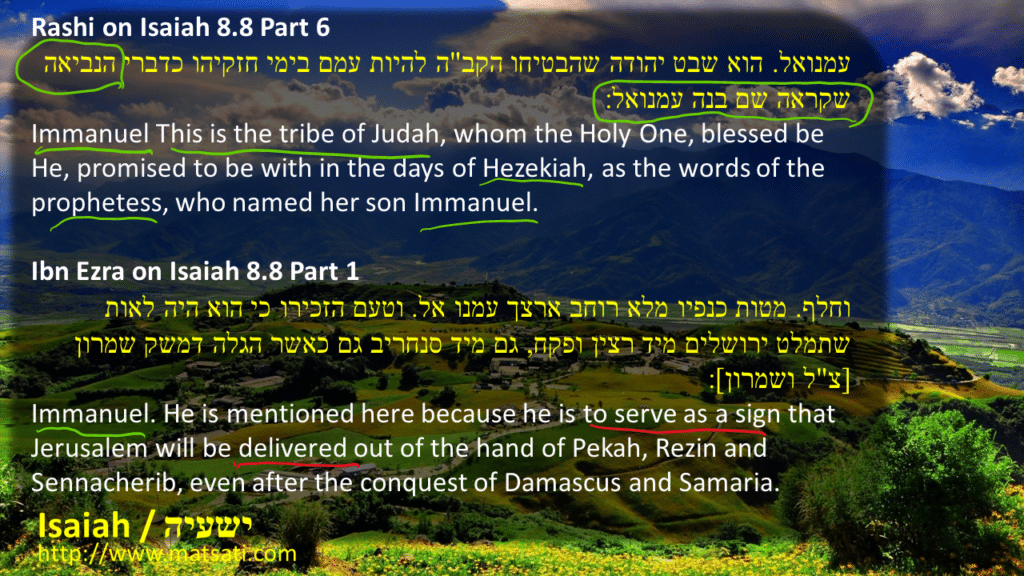
Rashi on Isaiah 8.8 Part 6
עמנואל. הוא שבט יהודה שהבטיחו הקב”ה להיות עמם בימי חזקיהו כדברי הנביאה שקראה שם בנה עמנואל:
Immanuel This is the tribe of Judah, whom the Holy One, blessed be He, promised to be with in the days of Hezekiah, as the words of the prophetess, who named her son Immanuel.
Ibn Ezra on Isaiah 8.8 Part 1
וחלף. מטות כנפיו מלא רוחב ארצך עמנו אל. וטעם הזכירו כי הוא היה לאות שתמלט ירושלים מיד רצין ופקח, גם מיד סנחריב גם כאשר הגלה דמשק שמרון [צ”ל ושמרון]:
Immanuel. He is mentioned here because he is to serve as a sign that Jerusalem will be delivered out of the hand of Pekah, Rezin and Sennacherib, even after the conquest of Damascus and Samaria.
It is obvious that Isaiah 8 connects back to Isaiah 7, both Rashi and Ibn Ezra point this out in their commentaries. Reading their commentaries, we receive a particular insight, notice how Rashi says Emmanuel is of Judah and Ibn Ezra discusses the idea that he is related to the deliverance of God’s people. Both of these commentaries connect the עִמָּ֥נוּ אֵֽל (Emmanuel) to the Messianic Expectation, the one who is from the tribe of Judah, and the one who delivers God’s people.
Isaiah 8:9 states, ט אִתְחַבָּרוּ עַמְמַיָא וְאִתְבָּרוּ וְאָצִיתוּ כֹּל דִי בִסְיָפֵי אַרְעָא אַתְקִיפוּ וְאִתְבָּרוּ אַתְקִיפוּ וְאִתְבָּרוּ: 8:9 Associate yourselves, O ye people, yet ye shall be broken; and give ear all who are at the ends of the earth, strengthen yourselves, yet ye shall be broken, strengthen yourselves, yet ye shall be broken. י אִתְמְלִיכוּ מְלַךְ וְיַעֲדֵי מַלִלוּ פִּתְגָמָא וְלָא יִתְקַיֵם אֲרֵי בְסַעֲדָנָא אֱלָהָא: 8:10 Take counsel together, yet it shall pass away; speak the word, and it shall not be established, because God is our help. (TgJ) It is strange how in Isaiah 8:10 TgJ does not transliterate the words עִמָּ֥נוּ אֵֽל (Emmanuel) that we find in verse 10. He concludes that עִמָּ֥נוּ אֵֽל which translates as “God with us” is indication of His presence being in our midst and being present He will also be our help. Note that the Lord God does not remain in a place without being involved in that place. This again speaks to our relationship with God, that we should be ever growing in our service to the Lord! We note Ibn Ezra’s comments on Isaiah 8:9 speak to this saying the following:
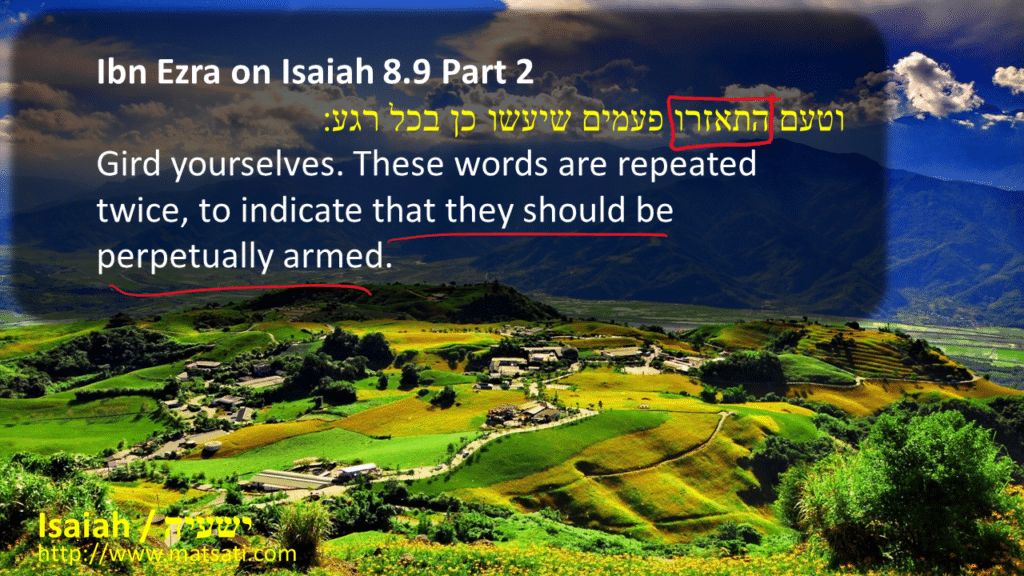
Ibn Ezra on Isaiah 8.9 Part 2
וטעם התאזרו פעמים שיעשו כן בכל רגע:
Gird yourselves. These words are repeated twice, to indicate that they should be perpetually armed.
So Ibn Ezra points out the word הִתְאַזְּרוּ (gird yourselves) and we note this is repeated (written twice) in Isaiah 8:9. This idea of girding oneself and of perpetually arming oneself reminds us of the words of Paul according to Ephesians 6.
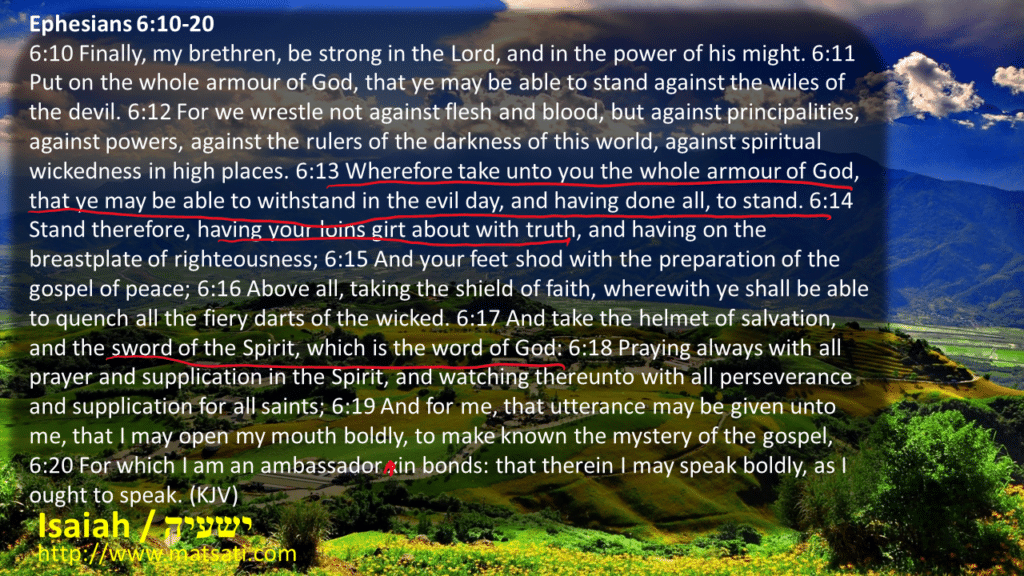
Ephesians 6:10-20
6:10 Finally, my brethren, be strong in the Lord, and in the power of his might. 6:11 Put on the whole armour of God, that ye may be able to stand against the wiles of the devil. 6:12 For we wrestle not against flesh and blood, but against principalities, against powers, against the rulers of the darkness of this world, against spiritual wickedness in high places. 6:13 Wherefore take unto you the whole armour of God, that ye may be able to withstand in the evil day, and having done all, to stand. 6:14 Stand therefore, having your loins girt about with truth, and having on the breastplate of righteousness; 6:15 And your feet shod with the preparation of the gospel of peace; 6:16 Above all, taking the shield of faith, wherewith ye shall be able to quench all the fiery darts of the wicked. 6:17 And take the helmet of salvation, and the sword of the Spirit, which is the word of God: 6:18 Praying always with all prayer and supplication in the Spirit, and watching thereunto with all perseverance and supplication for all saints; 6:19 And for me, that utterance may be given unto me, that I may open my mouth boldly, to make known the mystery of the gospel, 6:20 For which I am an ambassador xin bonds: that therein I may speak boldly, as I ought to speak. (KJV)
We note the significance of Paul’s words in light of what we have been reading in the book of Isaiah thus far. Paul lays down the foundation of a life of faith and faithfulness unto God. The people of Isaiah’s time missed these significant points, how great the nation could be who seeks the Lord, just as we read in Isaiah’s opening chapters, that the nations would stream to Jerusalem, if she had only sought the truth of God as opposed to the idols of the nations. Paul writes of the power, the might, and the strength of God, and of having these things when we put on the whole armor of God. Ibn Ezra reminds us הִתְאַזְּרוּ (gird yourselves) and of girding ourselves so that we may be perpetually armed. See the connection to Paul’s words in relation to the armor of God. The power of God in our lives enables us to stand in the day of evil (6:13). Paul speaks of the sword of the Spirit, which is the word of God. He speaks of righteousness, which are the ways of God. He speaks of perseverance and prayer and of the salvation that God has brought to our lives through His Son Yeshua (Jesus). All of these things speak to the need for our being diligent to seek the Lord God Almighty in heaven by faith in His holy Words, and in His Son Yeshua the Messiah. This faith that we have is coupled to patience, to waiting upon the Lord, and living our lives in a way that honor’s God and His Word regardless of the situation. All of these things that we are studying speak to the deliverance God is going to bring for His people, of the Messianic Expectation, and the joy of deliverance. Maimonides writes that the person who does not believe in the Messiah and awaits His coming denies the Torah. A midrash on Isaiah states the following:
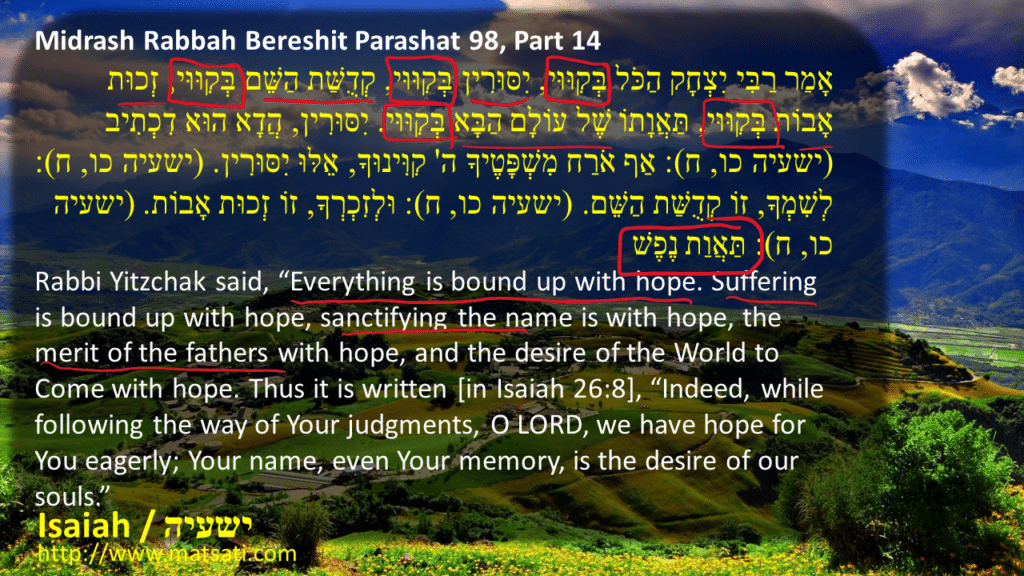
Midrash Rabbah Bereshit Parashat 98, Part 14
אָמַר רַבִּי יִצְחָק הַכֹּל בְּקִוּוּי, יִסּוּרִין בְּקִוּוּי, קְדֻשַּׁת הַשֵּׁם בְּקִוּוּי, זְכוּת אָבוֹת בְּקִוּוּי, תַּאֲוָתוֹ שֶׁל עוֹלָם הַבָּא בְּקִוּוּי. יִסּוּרִין, הֲדָא הוּא דִכְתִיב (ישעיה כו, ח): אַף אֹרַח מִשְׁפָּטֶיךָ ה’ קִוִּינוּךָ, אֵלּוּ יִסּוּרִין. (ישעיה כו, ח): לְשִׁמְךָ, זוֹ קְדֻשַּׁת הַשֵּׁם. (ישעיה כו, ח): וּלְזִכְרְךָ, זוֹ זְכוּת אָבוֹת. (ישעיה כו, ח): תַּאֲוַת נֶפֶשׁ
Rabbi Yitzchak said, “Everything is bound up with hope. Suffering is bound up with hope, sanctifying the name is with hope, the merit of the fathers with hope, and the desire of the World to Come with hope. Thus it is written [in Isaiah 26:8], “Indeed, while following the way of Your judgments, O LORD, we have hope for You eagerly; Your name, even Your memory, is the desire of our souls.”
We note how this hope involves having faith and waiting upon the Lord. We also note that all of this hope that we have and waiting upon the Lord, these things are not done passively, but actively in service to God. We have the hope of salvation in Yeshua the Messiah, this is a NT promise. The Messiah is the hope of Israel, we wait for Yeshua, we wait on His mighty return, the hope of our salvation. As the people of God, we should not forget these things in the business of life. We live with anticipation, but we also live with perseverance and equipping ourselves for war in the spiritual realm. We equip ourselves for anything that comes our way when we remain in God’s holy Word! Notice the Torah connection to all of these things, and the truth of the words Maimonides speaks saying that a person who does not believe in the Messiah and awaits his coming is as one who denies the Torah! The Torah which is the foundation stone upon which all of the Scriptures stand! These things all speak to the power of the present day with God’s presence in our lives, and the hope of the future with the knowledge of the past, of suffering, persecutions, and the covenant of our fathers Abraham, Isaac, and Jacob, and of the Olam Haba (the Word to Come). Faith in Yeshua the Messiah couples all of these things making them become a reality for our lives, for the glory of God in Heaven!
